#this is what people looked like when they found out that the soviet union had been dissolved
Explore tagged Tumblr posts
Photo

#this is what people looked like when they found out that the soviet union had been dissolved#reaction image#reaction meme#daily reaction images#image mood: w h a t#submission
26 notes
·
View notes
Text
The Arcturus Missions
Part Two - To the Stars
Part One
———
When people speak about cultural differences, they expect some language barriers and mishaps because of how you were raised. Sticking four people of not only different cultures but different age groups on a rocket not destined to return to Earth might not have been the brightest of ideas, but they were some of the best pilots that Earth had to offer and the ones with the least attachments. Both those combined made it seem like the perfect idea, differences be damned.
Hound was originally from California but was a military brat, so he spent the better part of his life in the culture of the US military, enlisting himself at eighteen and not looking back. When the pilot program came around, he set himself on the long list of volunteers to see if he’d be compatible with Mecha or not. When he eventually was found compatible, he was shipped off to the research center to work on a special Mecha, one that was made more to confuse the alien than to destroy it, perfect illusions and the perfect decoy. That was back when everyone still thought we had a fighting chance. He’d had his suit for years and its overhaul for space fairing was just par for the course of how his career had gone. Pilot 1124; divorced, no children, mother deceased, and father career military. Near perfect candidate for Arcturus mission.
Breakdown was from what is once again Ukraine, growing up behind the iron curtain left him at a slight disadvantage when it came to understanding the Mecha Suits. He was initially pulled into the Soviet program while under mandatory conscription, it was just a few months before his two years were up, but when he was found to be compatible with a recently vacated suit there was no questions on who would fill it. The solitude of working in a suit appealed to him, cause when you’re in the suit and turn down radio communications, it’s like it’s just you and the enemy you’re tearing apart. Very fitting for him. His suit has gone through many renditions both before and after the fall of the curtain, even its adjustments by Mecha, on semi-permanent loan; were normal. He just tried to make sure his cockpit remained the same, it was the environment he became the most familiar with, even more than his apartment in Kiev. Pilot 1457; no wife, no children, mother and father reside in Kiev, Ukraine; siblings vary. Non-perfect candidate, cooperation with former Soviet Union mandatory. Candidate for Arcturus mission.
Sunsteaker and Sideswipe were civilians from Florida, no previous family enlistments of record, no prior record of draft selection. These two came about later in the program, hand selected by Mecha for military training and transfer to the primary facility. When the boss saw their shining personalities at a not-so-legal street race, it was practically love at first sight. Being younger when the aliens first attacked had left both with scars in both literal and figurative senses, being compatible with vacated suits that often worked in tandem made them the right choices for the selection. Neither suit was particularly powerful, but both were considered abnormally fast. With limited options in their previous region of residence and mutual desire to make a difference, candidacy was the only feasible option. They more often than not work together and are currently heading towards the record of most take downs by tandem units. Overhaul was limited, newer suits without much need for adjustment. Pilot 2450 and 2451; no wives, no children, mother deceased, father deceased, siblings enlisted together, perfect candidates for Arcturus mission.
For a mission that wasn’t meant to go well, picking the right candidates was key. For each of the missions, three of them were already planned out of course. The work on the Mecha needed to be started as soon as the first batch were done, they didn’t to be able to sustain a human life for at least a year in space plus more intense gravity that what existed on earth, as a precaution. You didn’t know where these things could or would crash once a pilot was dead inside, if recovery efforts could be made in a hand full of decades for the suits that saved the earth, that could turn a major profit in a hand full of years. Limited or no connections for these pilots was important. It was bad enough that Jazz had some family that needed paying off and he was meant to come back with data for the Arcturus missions, he was meant to go back up on Arcturus One. Well, there wasn’t much use in looking at the past, not when there was an enemy to annihilate.
The day of the launch was the first time in several years that when suiting up for a mission, none of the pilots put on the assistant suits, but flight suits for the shuttle. Each was still colored in the tones of their corresponding Mecha, helmets on to hide a majority of their features and numbers sat right below their name badges. It was the wait that was practically killing them, sat inside a giant warehouse with nothing to keep their mind off the endless expanses of space. No one could be bothered with trying to face them, for those who didn’t pilot a suit they could never understand the sacrifice and those that did were being kept away. Life and death, the state of the world as they knew it could lay on their shoulders and the data that their suits would collected and send back to earth while they hurdled towards their potential doom.
“Do you think Jazz felt like this? His last night before bugging out?” Sideswipes voice was both muffled and painfully loud, coming through their helmets while being muffled in the echoing space.
“It’s possible, but he didn’t have to deal with the fan fair of the last few weeks, so maybe not. He might have gotten a decent night sleep and woke up, ready to face the stars.” Hound leans his head back to stare at the glass ceiling, the sky was almost too blue out there. The type of day when those things would attack without mercy, he shudders slightly.
“You think the others will be able to handle the fight while we’re gone?” Now Sunstreaker was asking the dumb questions, leaning forwards and resting his elbows on his needs, helmet in hands, “Losing four of us is a lot.”
“They will be fine Kid, losing four for a specific region is easier to cover than four deaths spastically.” Breakdown’s voice was the very stereotypical, learning English from movies, that tone that actors of the seventies and eighties had when over exaggerating their words. His ankles were crossed and he was leaned back comfortably in the chair, eyes closed though hidden by the helmet.
There was silence for a few seconds, before Hound cleared his throat, “Besides, if any of us kicked the bucket in our mechs, half of ours are outdated and would be out of commission for a while and the other half are far to specialized to get compatible pilots for straight off the list.” Rubbing his shoulder, he shrugs a bit. Sideswipe looks over, “Everyone said the same thing about First Aid’s mech, that freak of nature seems to not want to let go of that guy.” In some manner, they all hum, nodding or grunting, “Sometimes the suit just knows when it has the right pilot.” Breakdown’s tone was final, meaning that the conversation should end there.
“You think we’ll find him though, right? We’re heading on the same flight path.” Sunstreaker looks to Hound, fingertips lightly grasping the bottom edge of his helmet, “I don’t know. We can only hope.” Then they fell to silence again, they’d have enough time to talk each others ear off for the rest of their lives, no matter how long that would take, they’d have the rest of them together now whether they liked it or not. Sideswipe lightly grasps Sunstreaker’s shoulder, Hound goes back to staring and frowning at the sky, while Breakdown stares at his boots.
—
It took a while for them to get called to their action places, as if this was a film set and not a launch pad. There was nothing for miles out here, but the sheer number of camera’s recording their last steps on earth was part of the plan. Plan for funding, plan for advancement, and plan for god knows what else. The boss with his dazzling smile stayed away, watching from afar, leaned against a car far nicer than any pilot would be able to afford even with their insane salaries. The warehouse with its glass roof wasn’t far from the specially crafted launch pad, that was supposedly brand new but already covered in scorch marks from Jazz’s under the rug mission. None of the pilots said anything though, the money that was just minutes away from hitting the bank accounts of those they cared about most was to important. And those without loved ones, well they didn’t want to take it away from the other pilots and their families.
Walking in a line, they didn’t say anything, staring at the shuttle with the slightly folded Mecha attached to it, the cone on the front to cover them all making it appear like a giant umbrella was covering them from a non-existent rain storm. The launch pad was recessed into the ground, to prevent some of the damaging fuels from leaching or spreading onto the nearby land. If there was one thing Mecha was trying to seem, it was conscious of the planet they protected. The lift was just big enough for the four of them and an operator to fit on it, that and a camera trying to get their closeups perfect. Hound lightly shoved the hovering camera robot, trying to stay focused. Sideswipe chuckled lightly, adjusting his flight suit a bit, Sunstreaker shoves him slightly and shakes his head. It was starting to feel normal, the prep for this mission, at least this part was not dissimilar to going out in a suit for a fight. The lift jars to a stop, sending them stumbling lightly as the gate opens to the gantry, the ship’s primary door standing open and waiting. Looking at each other, they step put and to the ship.
Each seat was marked with their call sign, designating their set position, the in cabin cameras rolling for the launch. A airlock to the cargo bay was blocking the view of the specially made gangways into the suits, designed to attach to the alerted entranced into their piloting stations. No longer would the suits slip open to take in a pilot, now only had one entrance and exit; when shut it was hard to tell there was an entrance to the suits at all. The last thing Mecha wanted was whatever this enemy was plucking their pilots out of the cockpits in space, it was bad enough they were figuring that out planet side. Strapping into their seats, the airlock was closed by the lift operator with a whispered ‘good luck’. Pilots stuck together even through the stupidest moments. Like taking the fight into unfamiliar territory that had already claimed on of their own.
Before the microphones were turned on, there were quiet murmured prayers and declarations of revenge, Jazz’s name on all their lips for a moment before Hound turned the switch to activate the microphones. Calling out flight preparations and getting the shuttle ready to launch itself, four mech suits, and pilots into the vastness of space; was almost intimidating.
It was like any other mission to space, whenever astronauts were heading to the ISS, it was almost like that. Only they weren’t stopping in orbit and were going farther than almost any human had before, it would be easy, or so said the boss. God he was awful. The engined ignited with a roar and a harsh tug as gravity attempts to keep the rocked tethered to the planet. Each pilot was watching their given system, no longer worried about the cameras or those listening, focused on each other and the mission. With the pull and the radio traffic, the assent into space would become a blur for all of them, not bothering staring out the windows and focused entirely on their equipment. Space and the fight of a life time laid in front of them.
—
A loss of contact was expected, planned even, it was usual on the other side of the moon. They could speak freely, though their instruments were still the priority, “Did any of you think about the fact we’re going to be stuck together for, who knows how long? Cause that just occurred to me.” Sideswipe was now staring out the window as the lunar surface that none of them would get to touch, frowning slightly as the tinted shield of his helmet was clearing away from the harsh sunlight of the southern sky they’d been in, now hours ago. His brother turned to look at him, “I reminded you what this mission was, several times, over the last year and it’s just now occurring to you?” The tone was one of almost hate, the kind of hate you could only have when your sibling was being an absolute moron, “Well, yeah. I didn’t really listen to your rants.” The first thing thrown in zero-g was an iPod, still hitting Sideswipes helmet but not as harshly as Sunstreaker would have preferred.
Breakdown felt like putting his helmeted head through the console in front of his, “This is going to be the longest mission ever.” Removing his helmet, he rubs his face, looking to Hound who’d already taken his off, “You can say that twice.” As a helmet was thrown across the cockpit of the shuttle, “A very, very long mission.” Both the older men glanced back at the bickering twins, who had now unstrapped from their seats and tumbled back towards the main hold and their suits where artificial gravity would help them fight each other better. The loss of contact was normal, primarily because they knew that this first stretch of the mission would either succeed or fail. Data was still getting sent back to earth, slowing in its response the further away they got from the planet. It was normal, it was totally fine, things would be fine. At least, they kept telling themselves that.
The view out the front glass was of infinite space, Jazz’s last coordinates logged into their system for a potential recovery of his mech and a hopeful anticipation of finding wherever those aliens called home. Or even just their own launch point, since no one knew where or how they kept coming to earth, to many questions with even fewer answers.
A loss of contact was normal. They lost contact with Jazz and his mech after two weeks of him in space. It would be way harder to lose contact with a shuttle and four mech’s, right?
———
A/N:
Wow, thank you so much for enjoying the first part! I promise that part 3 is going to follow. I don’t know how many of these I am going to write, or where it’s exactly going, but the four people aboard the shuttle are out for revenge. On who? They aren’t entirely sure, but whoever is holding Jazz is likely it, right?
Anyways, next part will probably dive more into their mission, and likely the loss of contact with Earth. Who knows how they get to Cybertron, hehehe. All the boss knows is that Arcturus One merch is selling like hot cakes, they can fake contact for a little while with the tech they possess, plus Arcturus Two takes off in less than a year! So they got to get ready for that.
Hope you all enjoyed.
Specifically want to tag @lunarlei68 & @whirlywhirlygig for re-blogging the first post. If you haven’t read it, it’s linked.
Thank you @keferon for inspiring us all with this.
#transformers#jazz#tf mecha universe#keferon#hound#breakdown#sunstreaker#sideswipe#maccadam#the Arcturus missions#mecha pilot jazz au
44 notes
·
View notes
Text
Harum Scarum Review

The second Gene Nelson and Sam Katzman picture starring Elvis Presley. Inspired by Rudolph Valentino's The Sheik and filmed on the original Cecile B. DeMille's set of The King of Kings, Elvis had hope of finally getting a movie that allowed him to be more of an action hero. Given that Peter O'Toole's 1962 film, Lawrence of Arabia was a massive success for Columbia Pictures, MGM likely wanted to capitalize on that success by using a guaranteed money maker in Elvis.
Unfortunately, the hype Elvis had regarding the possibility of being a Rudolph Valentino figure was quickly squashed. He received the script and realized that his character wouldn't live up to the expectations he originally had. It's a pretty known story that even the Colonel thought the script was so weird, he thought it should include a talking camel. This of course is in reference to the Bing Crosby and Bob Hope movie, Road to Morocco. Ironically enough, the reference I make to Zanzibar in my announcement post was another movie that the duo made. With Kissin Cousins being described as the begin of Elvis' decline, this movie is typically described as being Elvis' rock bottom. Is it really as bad as people say, or is it over hated due to outdated elements? Let's find out.

"Harem Holiday" while it sounds great, is very confusing in the context of this movie. Why is this movie called Harum Scarum when it's called Harem Holiday elsewhere and even has a song with that name? I get that it's a term meaning someone acting reckless and without care, but it doesn't relate to the movie at all. Both titles completely gloss over the very important detail of how Johnny ended up in the position he will end up in.
We immediately open to a movie within a movie as Johnny Tyrone stars in an Arabian film where he saves a woman by killing a jaguar with his bare hands. He even sings to her "My Desert Serenade" while he has the weirdest sideburns I have ever seen. And then the movie just ends to a roaring applause in front of what's an unusually white crowd.

Apparently this is being screened in front of Arabian dignitaries as a diplomacy mission by the US State Department. Why is this specific actor's movie being chosen for this mission when just by what we're shown, would be the equivalent of going into the Soviet Union and screen a movie of Elvis fighting a polar bear in Siberia? Only 2 minutes in and I already have a lot of questions on why this is the set up. He sings "Go East Young Man" and again why is this the song that you're choosing to perform in front of dignitaries you're supposed to schmooze? Again it'd be the equivalent of going into the Soviet Union and singing a song about drinking vodka with Josef Stalin. It's just so stereotypical that if this was a real diplomatic mission, it would be an absolute disaster. Dignitaries that you're trying to establish a relationship with, wouldn't see this as honoring their culture. If anything, what this movie should be about, is Johnny being kidnapped because they found his performance insulting.
Johnny Tyrone in this picture above summarizes Elvis' acting throughout the entire movie. Sir, you are meeting actual royalty and this is how you act? I can understand wanting to make a good impression but for goodness sake crack a smile. Or at the very least show humility by bowing before the prince. For someone who's supposed to be an actor/stuntman that was given a golden opportunity to act as a diplomat of American culture on this mission, Johnny looks like if it wasn't for Aishah, he literally couldn't care less to be there. Even when the prince invites Johnny to the king's palace (making him the first American to ever do so) Johnny looks bored out of his skull.

After traveling with the prince to Lunarkand, Johnny stops at a camp. Johnny goes to flirt with Aishah and we get a Red West appearance as on of the attackers. I know Star Trek didn't come out yet, but what is up with these costumes? These men look like an alien race trying to disguise themselves as human. Also this is the worst depiction of drugging someone I have ever seen. It's obvious that Aishah drugged his drink, but what drug could possibly work that fast? Whatever plot they want to commit would be executed a lot faster if they simply used a little too much of the Brand X drug if it's truly that effective. Drinking something is the slowest method you could possibly use to drug someone. It doesn't go directly to the brain like inhaling a substance.
The prince is obviously behind this and any twist that comes from it, is gone. My reason why it's so obvious: the prince would be completely incompetent if he traveled without any type of security for himself. So the fact that these men were able to enter his camp with absolutely no resistance indicates that this was planned to happen. If this was truly just a plot by Aishah, he would've been a victim as well to get the King's attention or attempt to implicate Johnny for the crime so Lunarkand would go to war agains the US. But that didn't happen. The prince is conveniently resting in his tent while Johnny is kidnapped.

I have never laughed so hard at an Elvis movie as I did when Johnny starts singing "Mirage". You have Johnny who was just kidnapped waking up in a strange place and what does he do? He literally starts singing to the slave women thinking this is just a dream. How in the world are we supposed to take anything that happens in this movie seriously? Johnny is being held captive in a Middle Eastern country and nobody will even know about it until after a week when Johnny doesn't return from his vacation. But no we need to have a gag about how Johnny's horny for slave women.
Even when he's facing Sinan, the leader of assassins who wants him to kill the King of Lunarkand, he still doesn't seem to care. All he does is make a snarky remark about how stupid it is to believe he can actually kill a jaguar with his barehands. Even if it was actually true, that just makes him all the more boring. Why should I care about Johnny Tyrone, if he's shown to be physically invincible and doesn't even seem all that scared about the amount of danger he's in? That isn't relatable. It's especially worse when you get the racist stereotype that poor Arabians are thieves in the form of Zacha offering to help Johnny escape for 10,000 American dollars. He explains how this country is so isolated that there's airport. How would Zacha even know what an airport was if Lunarkand's been isolated for 2000 years? And how does he speak fluent English if Johnny's the first American to even be on palace grounds? I just don't get how this world is set up.

Johnny escapes and runs into Princess Shalimar who for literally no reason says she's a slave girl. This would absolutely never happen and if anything makes me even more suspicious of the prince. Shalimar is a princess so she should have guards everywhere. Johnny would've been immediately captured just by being near her. Shalimar wasn't there during Johnny's movie screening so she has no reason to believe that he isn't going to be a danger to her. Johnny being hot isn't enough of a reason to trust him.
It also makes Johnny's plight even more frustrating to watch. For someone who's supposed to be on the run he sure takes his sweet time escaping. He doesn't take his safety seriously as he stops by the lake and sings "Kismet" to a woman he literally just met. It's a good song but it the movie literally stops when Johnny is supposed to be running away. When he tells Shalimar about Sinan and she runs away, it becomes all the more dumb that he wasted that much time. The guards are right on their heels and only get lucky in their escape.

So Johnny decides to follow Zacha until they find some dancing girls in Bar Esalaam that are part of Zacha's Den of Thieves. The stereotypes don't get better as you have an element out of the 1920s in the form a little person playing the mute fool named Baba. We've seen Billy Barty before in Roustabout and it's nice to have him do more than just one gag. I just wish they could've treated Baba as a real person, given how progressive it was to even have little people (especially since Billy Barty was the founder of the non-profit organization, Little People of America). Heck you know things are bad when you have me praise this movie for having a token black person be on screen in a movie that's meant to be in the Middle East. Are there pale skinned people in the Middle East? Absolutely. I don't mind that the royal family and their servants have pale skin. My beef is that a movie meant to be in the Middle East shouldn't have only one noticeably black person. Especially when you consider that Lunarkand celebrates Ramadan, a holiday celebrated by Muslims, who are typically darker skinned.
"Shake That Tambourine" I guess is good but why on earth are we stopping everything just for this? All we're doing is pro-porting the stereotype that all poor Arabians are thieves. What exactly is this accomplishing when Johnny needs to escape and he's going to pay Zacha $10,000? Nothing. If anything Baba getting caught stealing only brings attention to them. The guards chase Johnny in what's the most ridiculous display of physics I've ever seen in a fight. Johnny might be an actor/stuntman, but that doesn't mean he's capable of taking on a group of soldiers. The fact that this is being treated like one of his movies destroys any possible conflict. Why should I be worried about him getting caught when I know he's just going to beat them up and get away? What's worse is that you have two orphan children throwing rocks at the guards and it knocks them out. These children are about 10 years old at the oldest. Even if they're using a slingshot of sort, I just don't see them as being strong enough to make it at all effective.

"Hey Little Girl" has the worst context I've ever seen. Johnny is singing this song while a barely 10 year old girl dances like a stereotypical adult dancing girl. This isn't me taking the song out of context when the girl literally says she dreams about growing up to be a beautiful slave woman. Not to mention that there's literally a lyric that goes "Hey little girl, I'd like to take you home. Come on, come on, come on I want you for my very own." and another that goes "I want you swing it to the left, and shake it to the right. Hey little girl, you know you're lookin' fine". This is not at all appropriate for a girl this young to be shown doing that.
If you were listening to this song as just the soundtrack version, then it's just fine. It's a different sound that breaks up the monotony of his other songs. But when you watch it in context, it just doesn't match the actual intent Johnny has of wanting to adopt this girl. I of course don't blame Elvis because he didn't choose to have this be included. I don't think he realized that, her even doing this would be inappropriate since the movie itself has associated those moves to an adult woman in a more sexual nature. Movie scenes aren't always filmed in the order the audience sees them in, so I can understand why Elvis wouldn't have made the connection the audience would make. Regardless, there were better ways to have Johnny bond with the children he plans on adopting than this.

Aishah arrives at the Den of Thieves because Zacha is still working for Sinan. Knowing Johnny isn't a complete villain, she intends on holding the slave women and children hostage so Johnny has no reason to chicken out. In what is a very jarring display of seriousness, Sinan's men arrives at the den too with a bunch of weapons. They fully intend to kill these orphans if Johnny doesn't do it. The plot to kill the King is on as the plan is to kill him during the final celebration of Ramadan.
Princess Shalimar meanwhile laments that Johnny doesn't know she's a princess. That was entirely her fault so I don't feel bad for her. I get that she probably only said she was a slave girl to keep herself safe, but once she kissed Johnny, she never told him the truth. She's so down bad for Johnny, that she hallucinates seeing his reflection in her pool. I actually don't mind this break in reality since we're obviously supposed to understand this is just her imagination. "Golden Coins" is probably the only song with a Middle Eastern sound that doesn't feel completely stereotypical. If anything it gives us an insight that Shalimar wants Johnny to worship her by giving her many gifts. Very appropriate given how she's a princess.

So Johnny goes to the palace with the flimsiest disguise I have ever seen and I severely question what Sinan's plan is. Why on earth would you have Johnny try to kill the King when he's surrounded by everyone? If Johnny is trying to warn the king why would he take his knife out before explaining the situation? Having the knife in your hand is obviously going to lead to a "shoot first, ask questions later" reaction. Why is Sinan using Aishah to hold hostages knowing good and well that Johnny would never be killed? Johnny is an American who has people knowing that he'll only be gone a week. If he never returns from Lunarkand, the State Department is going to know he was killed. This was meant to be a diplomatic mission built into his vacation so even if the prince succeeds in killing the King, having Johnny be killed would only lead to war.
This is probably the most amount of emotion Johnny shows in the entire movie. He felt betrayed that Shalimar lied to him about being a princess. He's additionally upset that he let everyone down by failing. "So Close, Yet So Far (From Paradise)" is the most relatable song in this movie. At this point in watching, I looked at the run time and saw that I was barely at the hour mark. This movie felt so long that I had to pause and walk away for a minute to contemplate how a movie could be so complicated plot wise, yet also give you nothing. After coming back to finish this movie, Baba manages to set them all free. I take back what I said earlier as in a way, he did have a genuine character moment by getting past the guards to save his friends as opposed to running away to save himself. Johnny decides to try to reason with the King knowing he would have diplomatic immunity anyway.

Sure enough, things are smoothed over once Johnny explains himself. I guess the King only believes him because Shalimar vouched for his honor. In her heart of hearts, she never believed he could do such a thing. I mean she technically shouldn't anyway since again, Johnny killing the King as the first American to step foot on this land would be an act of war. Johnny isn't that stupid to risk that. Johnny comes up with a plan to keep the King safe, and expose Sinan. Meanwhile, we get actual whippings and the potential murder of women and children at the Den of Thieves. The true mastermind is of course revealed as the prince. However, what I didn't expect is for Sinan to betray the prince so he can take the throne himself. Granted there's the very big issue of Princess Shalimar being the heir to the throne, but I appreciate the attempt to be unpredictable. Sinan does after all, plan on keeping the prince alive so the people don't grow suspicious.
Johnny of course, exposes Sinan and saves the hostages in what's a pretty clever way. Using the slave women's bells as a means of misdirecting Sinan's men is a great way to get to Sinan and make him vulnerable. After a complicated plot involving the King fighting his brother that ends with Sinan getting shot full of holes by a machine gun somehow. The King defeats his brother with Aishah's hands being binded and promises Shalimar's hand in marriage to Johnny despite knowing him for only less than a week. The King doesn't even have his brother executed and instead has him banished. Because I guess blood is thicker than water and having your brother knowingly commit an act of treason without coercion on his part isn't as bad as Johnny only pretending to try to kill you. Aishah was part of the conspiracy too so unless she goes with the prince as banishment she would absolutely be executed for her treason. But no, we just jump right over that as if the King's possible assassination doesn't even matter.

We get one final performance and what I think is a Joe cameo with Johnny's new act in a reprise of "Harem Holiday". It's nice that Johnny fulfilled his promise to adopt the slave children, but what did you expect? Johnny isn't a complete villain to just let orphan children remain in slavery. There's just no reason to even worry about them, when there's no sense of complex morals in this movie. I have no idea why Johnny would even want to call it a holiday either. Sure he was on vacation and got a bride out of this, but getting kidnapped and being asked to assassinate a monarch should be traumatizing. I get that this is an Elvis movie and we need to have an Elvis movie, but really? This is the best way you could think of ending it?
It just raises several questions on how the movie ends. Why is Johnny performing in Vegas during what's supposed to be his honeymoon? Why did Johnny even decide to go back to the US at all when he's married to a LITERAL PRINCESS? If this country is so isolated that it doesn't even have an airport, how did Shalimar and her father even get into the country without a passport? This isn't a diplomatic mission and Shalimar wouldn't automatically be a US citizen just because she married Johnny. I'm just so baffled on how the movie emphasizes Lunarkand's monarchy and isolation only to completely erase that when Johnny marrying Shalimar would be a huge deal. The unfortunate reality is that nothing in this movie that's supposed to be taken seriously is taken seriously. And when you have that happen, all you have left to do is sit there and care about as much as Johnny does about everything: very little.

This movie at times was painful to sit through. I have seen The Sheik and Son of the Sheik before watching this movie. Those were made about 40 years prior to this one and were both silent. I enjoyed those movies a lot more. Things didn't age well but at least they had cohesive stories, and actors that express real emotion. When Rudolph Valentino is angry, he can be explosive, or silently seething without hearing a word. Elvis in this movie is just flat the entire time. This is probably one of the only times where Elvis has visibly given up without having had a concussion only a couple weeks prior to filming. When the movie is supposed to be dramatic, he's just so blasé I lose all investment. If Johnny can't even care about the trouble he faced, why should I?
I have no idea how to rate this. It looks nice visually and most of the songs if listened to out of context actually sound decent. Everything else ranges from mid to bad to (in the case of "Hey Little Girl") cringe inducing. IMDB has a current rating of 4.6 which sounds about right. Since it's not even 50% good, I'm giving this a 4/10. I wouldn't recommend watching this since if you like songs, just listen to the soundtrack. If you're looking for movies in an Arabian setting, do not watch this. Just watch Rudolph Valentino's movies on YouTube since that was what Elvis specifically expected. And when you take those stories for what it was, you'll see why they were used as a source of inspiration and just how unfortunate it was that this didn't measure up.
AN: Happy Holidays everyone. I hope you have a better time than I did. If you want to be tagged in future reviews, please leave a note here: https://www.tumblr.com/deke-rivers-1957/743326835519176704/ecu-movie-taglist?source=share
Tagging: @searchingforgravity, @mercsandmonsters, @i-r-i-n-a-a, @50sexyshadesfashionista, @atleastpleasetelephone,
@iloveelvis2, @arianatheangel-girl, @eapep, @vintagepresley, @peaceloveelvis,
@arrolyn1114, @smokeymountainboy, @tacozebra051, @hooked-on-elvis, @littlejoecartwright1842,
and @xanatenshi.
#harum scarum#johnny tyrone#elvis film review#1965#tw racist stereotypes#tw possible sexualization of a minor
16 notes
·
View notes
Text
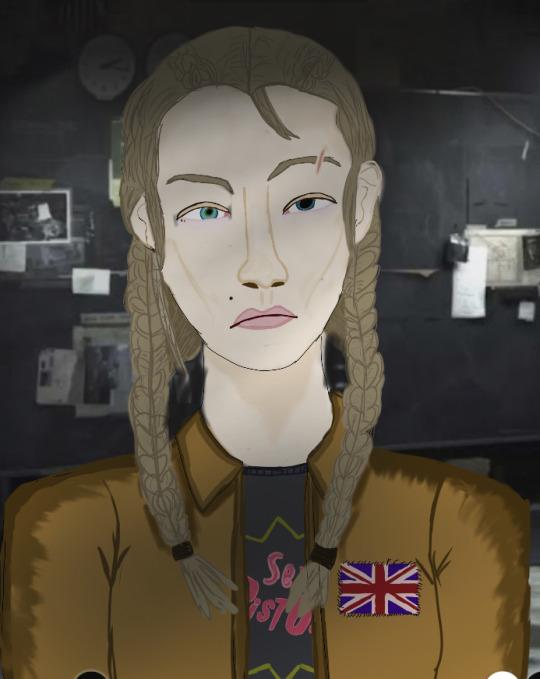
MY BELL OC FROM COD BLACK OPS COLD WAR!
I saw another artist make their version of Bell, so I decided to dig up my version (having just finished my 4th play-through of the game last night) and post her here! This is my first post here, and if people like it, then I might make more OC posts.
Side note that my Bell is based off of my reactions/choices in the game, so it might not be 100% realistic or canon. I’m going with the bad ending, but I shot Adler in the end.
INFORMATION:
Name: Diana Jones/Annika Nikolaevna Voronova
Languages: Russian and English
Nicknames: Nika, Di
Callsigns: Bell, as Diana.
Age: As Diane, about 35, her actual age is 23
Sexuality: Lesbian (though during the time, she couldn’t express it)
DOB: January 21st, 1958 (Another plot hole in the Vietnam false memories; she would’ve only been 10 at the time.)
POB: Volgograd, Russian SSR, Soviet Union.
Eyes: Blue-green (got an eye injury while in Perseus, making her right pupil constantly dilated)
Height: 5’7
WEAPONS
M16A1, 1911, M60, Tranquilizer Gun, MP5, Type 63, Gallo SA12, RPD, LW3 - Tundra, Pelington 703, Hauer 77, Recurve Bow, M79, War Machine, XM4, AK-47
EQUIPMENT
Knife, M67 Grenade, Tomahawk, Stun Grenade, Throwing Knife, Smoke Grenade, C4
•
Career information
Occupation: Perseus Operative, MI6 Agent, MACV-SOG, the latter two formerly (implanted memories)
Rank: Lieutenant in Perseus
Affiliations:
Perseus
CIA, MACV-SOG, MI6 (indoctrinated)
Annika joined Perseus relatively young, when she was 17, and quickly rose up in rank as the years gone by. She quickly earned ‘Perseus’s trust, as she was willing to do whatever it took to earn her place. They’d often have Annika undercover, performing assassinations and ‘cleaning house’ whenever necessary.
She was smart, crafty, resourceful, but she carried a lot of unbridled rage within her. Annika genuinely believed everything Perseus did was for the greater good of the USSR, which left her with no hesitation while killing whoever they told her to. Sure, you could argue that she was manipulated, but Annika didn’t really care.
Her methods were brutal yet efficient. Annika didn’t care about whatever mess she made, only getting away with it mattered (unless she was specifically ordered to make it look like an accident).
When she was 22, Kadivar shot her and left her for dead at the Trabzon airfield in Turkey. While Annika was bleeding out, Russel Adler found her half dead in the back of the car. While she was conscience, she bit, scratched, and kicked at him, until the blood loss got to her.
Annika didn’t even say a word while being interrogated and tortured. Before they brainwashed her, she even tried to bite off her own tongue. Was extremely aggressive the entire time.
(I’ll elaborate more on her story later, but this is all I have so far.)
Random thing: I don’t really understand when people ship Bell with Alder. I’ve seen them as having a bastardized father-child like connection. I could be biased, as I’m a lesbian and my Bell is 17-ish years younger than him, assuming Adler’s 40.
Personality traits:
‘Bell’ had a strong sense of loyalty before and after she got indoctrinated. She’d do anything for the people she’s close to without hesitation.
Extremely petty; would go to great lengths to give the people who wronged her hell. (Definitely isn’t a projection to how I played)
Stubborn + Contrary: Whenever someone, who isn’t a superior, tells her what to do, she would do anything in her power not to do it. However, ‘Bell’s stubbornness makes it difficult to break her.
Sarcastic:
Aggressive: Self explanatory
Immature: ‘Bell’s younger than people would expect, so she’s often labeled as immature by her teammates.
That’s pretty much all I could think now, if anyone has any questions or ideas to improve, LMK!
#call of duty oc#call of duty cold war#call of duty#oc#oc art#helen park#russell adler#lawrence sims#yippee#i need to pee#original character
36 notes
·
View notes
Text
Fanfiction of Franco interacting with my Outlast oc Parval 😭

Love this guy (probably posting cringe on main)..
Image is just for reference of what Parval looks like 😭 I'm not great at writing fanfictions so sorry if it's bad 💔
"..He shoved the barrel right against my head and kept demanding the money. It was like.. it was like he thought if he kept yelling at me, it'd just drop into my lap."
Parval's voice was flat, as though he'd told the story a hundred times before.. Although it was probably closer to three at most. He scratched at his nose absentmindedly, his fingers brushing over the leather strap of the muzzle clamped over his face. The cold metal beneath his touch made him pause. Oh. Right. Still there. He sighed heavily, earning a quick glance from Franco, who was hunched over his Lupara, polishing it with a focus that made Parval uneasy.
"Well, Parval," Franco drawled, The man's focus was still on his shotgun as he spoke, his thick hands sliding over the intricate carvings along the stock of the Lupara. "Better be thankful it wasn't me comin' to collect your debt." He paused, eyes darting up from his shotgun to give Parval a glance before dismissing him again. "If it was me, you wouldn't be sittin' here bellyachin'. I don't leave people alive to tell the story. Its.. bad for business to leave loose ends."
Franco's laugh came sharp and guttural.. yet also strangely childish, bobbing his head as if he found himself endlessly amusing. He moved to the scattered remnants of the ruined crates-what was left of his product. Damn reagents... always poking their noses into shit that didn't concern them. At least two of them got what was coming-one met the business end of Franco's Lupara- real nice and personal- , the other got mauled to death by Parval himself. Seems the man got to put those fresh new implanted dog teeth to use before a muzzle was clamped back onto his maw.
The product being ruined wasn't the part that pissed him off the most.
Parval hadn't moved a muscle to help since the two remaining reagents left. Franco noticed, and his professionalism refused to let Parval forget whose fault that was they even lost the product.. at least in Franco's mind.
"You planning on helping clean up anytime today, or are you just gonna sit there crying about your daddy's debts?" Franco grunted, his patience thinning as he once again glanced at the seated man.
"Yeah, yeah, I'm coming," Parval muttered, his voice tight with frustration.
He groaned as he pushed himself off the barrel, wincing as he gingerly placed his feet down-right leg first, then left. The external fixator strapped to his calf gave him more pain than he wanted to think about. He had barely any feeling left in it. He stretched out his legs, shaking off the stiffness before he started picking up the scattered casings littering the floor. He didn't want to be here, didn't want to help. But he understood the power Franco held.. so he pushed himself up to help-The tension between them was always there, thick in the air like smoke, but Parval pushed through. Franco wasn't even a part of the mafia responsible for his wife and boys' death. It was a Soviet group. Yet strangely, Parval found himself almost blaming Franco sometimes.
Franco had nothing to do with it.
He bent down, picking up another casing, his mind racing. He couldn't remember much of living in the Soviet Union. He knew him and his family were persecuted- they were called Kulaks. Land owning presents who were farmers. The farming business died with his father. Ironic! He was just running a business, trying to stay alive, keep the wife and new kiddo proudly named Parval after his grandfather alive, and somehow Mr. Tarasov and his family were enemies of the Union.. So some money borrowed when the land was stripped away from the family. Then more money when no one would buy from them anymore. More and more until-
Until suddenly, there were men at the door demanding the money back.. However when they came, the Tarasov's were gone.
The more he thought about it, the more it burned him. "It's not like I took out the damn loan," Parval muttered, voice growing hollow as the bitterness set in. "Why do I have to pay for it? I wasn't even in the Union anymore and when that mess started I was a kid... and now I'm supposed to clean up his shit? It's not fair." His hands crumpled up a casing, tossing it to the side as he growled out the words. He was only a dog trainer. He didn't even know his dad was in debt. Would have been nice for the asshole to tell him before he was dead! Parval assumed they moved to America for opportunities- not because there were men who wanted his whole family dead back in the Union!
Franco's voice was indifferent to Parvals sorrows, almost mocking. "Your pop did though. And someone had to pay. Depts don't just disappear if you cross a border." He straightened up, lifting his Lupara onto his shoulder, then shoved his worn pacifier into his mouth. Sucking lazily, he pushed it to the side of his mouth, speaking around it. "I got plenty of families to pay for debts caused by the leader of the house. Don't know how the Soviets handle things, but I figure they ain't too gentle about collectin' if they're anything like the Italians." and then continued on the uncomfortable wet noises of Franco's mouth around the pacifier as he stared dead-on at Parvals hunched form. "Italians, Soviets, Americans, moneys money, and sometimes you need to get your hands dirty."
Parval clenched his jaw. "Not my wife. My wife didn't do anything wrong. Neither did my son." His voice was low, furious, a hiss between his teeth. "In fact, neither did I. I didn't deserve-.." The room fell into an uneasy silence as Parvals voice trailed off, broken only by the wet, sucking noise of Franco's pacifier. Parval's patience snapped. "Could you stop with that thing? It's disgusting." He barked suddenly, head snapping in Franco's direction before looking away once again.
The sight of the oversized man lazily sucking on it was equal parts ridiculous and unsettling to Parval, and he hated it.
"Hmph." Franco didn't bother acknowledging the anger hidden- admittedly poorly- in Parvals voice. He gave a quiet, dismissive grunt and shoved the pacifier back in, the wet sucking sounds filling the space between them. He knew it irritated Parval, and that was reason enough to keep it up.
Parval's hands tightened into fists, the leather of his gloves creaking against the strain. He stood as straight as he could, his posture stiff with anger. He hated that damn thing. If he thought for one second that Franco wouldn't put a bullet- or.. tooth in his skull, he'd tear it out of his mouth, throw it in his face. But he knew better. Franco's Lupara didn't miss, and the man was too good at pushing buttons.
He hated feeling this angry. After all, he took pride in being the most collected of the Prime Assets. He vouched he would never fall into such bad delusions as Coyle or Gooseberry. The thought of turning out like them.. It terrified him. So he bit it down and forced himself to be as mellow as a lapdog.
So silence fell, thick and uncomfortable. Neither of them had the energy to argue further. The tension between them was always the same: one of them was part of the mafia, the other was a victim of it. They'd never be anything but enemies in that way. They were on two totally different sides of the spectrum and never could quite sympathize with the other. Parval regretted even bringing up his past at this point.. It would probably just lead to-
Franco broke the silence suddenly with a question that cut deeper than he probably realized- or maybe he did realize, which was why he asked; "Was she pretty?" Franco asked suddenly, his tone casual, almost bored. "Your wife, I mean. Maybe that's why they took her." He said, popping the pacifier out of his mouth with a wet sound.
Parval gave him a look of pure disdain before he looked at the floor, the toe of his boots scuffing against the grime, dried blood, and whatever the hell else was caked onto the floor.
"They said... they said killin' me was easy. Too easy. Said it was merciful even. So they wanted to do something that would cut deeper." Parval's voice wavered as he answered, but he quickly steadied himself, refusing to let any emotion show. Crying wouldn't help-crying would only get him mocked. So he focused on something else-anything else. 'Anything else' just so happened to be his wife.
"She was the most beautiful woman in the world." His voice hitched, briefly pausing before the words came tumbling out of his mouth before he could stop them. "She had shoulder-length brown hair, freckles-tons of them. Short, maybe about Coyle's height when he's hunched over. She was pudgy- in a cute way. In all the right places is how you would put it, I guess.. A motherly look about her.. A cute little nose... Soft... she had this soft, warm look about her.. she would've been a great mom.""
The words tumbled out before he could stop them. His breath caught, and the silence that followed was thick, heavy. He hadn't meant to say all that. He cleared his throat, trying to regain control.
"... She knew how to command a room."
For a moment, Franco didn't say anything. Then, with a grin that was more teeth than anything else, he cocked his head and whistled, his dirty blonde hair falling messily over his face. "Sounds like my type of woman." He purred in a tone that made Parvals stomach twist with disgust and anger. He was seriously going to talk about a man's wife like this? Right in front of the husband?! Parval almost lashed out until Franco shoved a hand up like he sensed Parvals anger. "Heel, boy." Franco added, the mocking command laced with condescension. "I'm just messin' with you."
Parval grunted, looking away at the command. Dehumanizing piece of human garbag-
But, unfortunately for Parval, Franco wasn't done. "She take you good?" His tone was teasing, but there was something darker beneath it-something that made Parval's stomach twist. This guy was such a freak. Apparently, 'motherly' and 'warm' weren't the words you should use to describe your dead pregnant wife to a mommy-kinked pervert wielding a gun he probably jerks himself with.
Parval barked a laugh, bitter and hollow as he felt a familiar heat rushing to his face. "Like I'd tell you that." He hesitated, an awkward silence filling the air as Franco shot him a knowing glance. Moments ago he had zero intention of answering Franco but.. softly, he muttered, almost to himself, ".... she-she sure did."
He almost sounded defeated as he said it, which only made Francos amusement stronger.
That short answer earned Parval a roar of laughter from Franco as he stepped closer, shoving the barrel of his Lupara against Parval's side in what could have been a playful joke-or a warning. "Lighten up, Tarasov," he said, smirking. "You're wound tighter than a noose."
Parvals eyes widened with fear for a moment, body stiffening before relief crossed his features when he realized he didn't intend to actually use the gun. He sheepishly chuckled with Franco, grinning at the man with an uneasy, toothy smile.
Franco chuckled, his laugh loud and grating. "I'll take that as a yes, you fuckin' freak," Franco teased, his hand curling around the muzzle strapped to Parval's face. He shook it roughly, suddenly pulled it hand back after a few rough tugs. "Muzzle says it all." The shaking sent Parval staggering backwards before he caught himself against the packaging station behind him. Franco hummed, taking his pacifier back into his hand and stuffing it into his mouth once again.
"Yeah, well," Parval muttered, rubbing the back of his neck as he regained his footing. "At least I don't advertise my weird habits with a pacifier. Christ.." he grunted, casting Franco's pacifier a glance of disgust. He didn't even bother trying to defend himself. The muzzle was not a kink thing, it was more of a.. precaution. However it seemed to just be general belief he enjoyed wearing the muzzle..
Not when your face constantly itches and you can't scratch it properly, or can't even smoke without having to beg a doctor to take the damned thing off.
Whatever.
"Well, can't say I blame you." Franco smirked, popping the pacifier back into his mouth. It was almost like he was trying to make Parval uncomfortable - then again, he probably was. "Heaven in two and a half minutes the first time you got her, eh?" he said, grinning around the plastic before Parval abruptly cut him off with an exasperated grunt.
"Don't want to talk about my sexual encounters." Parval shot back, waving a hand in exasperation. "At least- not with you of all people."
Franco laughed again, turning back to his work. For a moment, the tension eased. But Parval knew better than to let his guard down. Franco Barbi wasn't someone you ever truly relaxed around. However, the silence wasn't so uncomfortable anymore. It was almost pleasant.
Almost.
#outlast trials oc#outlast trials fanart#outlast trials#outlast trials franco barbi#outlast trials fanfic
7 notes
·
View notes
Text
July/August/September Reading Recap
look, it's been a wild time. that's all I'm going to say about it. but now back on the reading recap train and I'm just going to do all of these three months in one go because otherwise I really never will catch up (also read not very much for me in all of these months, individually)
Revolting Prostitutes: The Fight for Sex Worker's Rights by Molly Smith & Juno Mac. I read a lot of books over the last few months that I was kind of "meh" about, but this wasn't one of them. An incredibly nuanced, in-depth and very persuasive analysis of the history and present of sex worker labor rights - neither skewing too far into "sex work is liberatory" nor (obviously) the opposite. The authors consistently approached the subject positing (accurately) that sex work is first and foremost work, and should be approached as such in terms of the goals and needs of rights for sex workers. I already bought into the overall premise of this book, but it still remained compelling and educational for me to read, and I'm going to be recommending it to a lot of people who may be generally liberally-minded but have doubts or hesitations about decriminalization as a strategy that ultimately serves the best interests not just of sex workers but of society at large.
Bloodlands: Europe Between Hitler and Stalin by Timothy Snyder. This was a brutal book to read and I'm glad I read it. I like Timothy Snyder as a historian generally (I've read two of his other books before this one), and I learned a great deal here in particular about Stalin's policies, both in Ukraine and during the war. Some of the ground treaded in this book was familiar to a certain extent from Black Earth, but dug into more and in more depth, particularly prior to World War II itself (i.e. the Holodomor and other associated policies in the Soviet Union). I found the closing parts of the book about the politics of forgetting particularly compelling. Not a casual recommendation but a recommendation nonetheless if you're interested in history and up for the rough ride.
Witch King by Martha Wells. I was...not disappointed by this book, exactly, but a little underwhelmed. I wanted to like it much more than I did. Oddly, while I'm completely in favor of self-contained stories that close in one book, and I definitely liked Kai as a character quite a bit, the whole thing felt sort of rushed, particularly at the end. Everything was tied up a little too neatly, too quickly, for my taste, and in general some of the worldbuilding felt underdeveloped rather than (as I think was probably the intent) intentionally left underexplored in text. All in all, I had high hopes for this one that weren't quite met.
Where the Jews Aren't: The Sad and Absurd Story of Birobidzhan, Russia's Jewish Autonomous Region by Masha Gessen. I love Masha Gessen as a historian and writer and this was a short but intriguing book about an episode of history I knew next to nothing about - namely exactly what the title says on the tin. I'd recommend to anyone who has even a little interest in Jewish history in the Soviet Union in particular, though this one didn't blow me away quite as much as The Future Is History did (but that's a high bar).
From Below by Darcy Coates. Darcy Coates is rapidly becoming a favorite horror writer despite the fact that this is only the second book of hers that I've read. She does scary really, really well and this is some top notch ocean horror. Definitely a book that propelled me through all the way to the end and left me with some truly appalling (affectionate) mental images. Good shit, thanks for the rec @bereft-of-frogs (I believe).
Uncanny Valley by Anna Wiener. The conceit of not naming, just describing the tech companies under consideration in this memoir got a little tired after a while; this was an interesting book but probably would've been more compelling when it came out, before most of what it's exploring was common knowledge. But maybe that's partly because I'm just not really a memoir gal.
The Luminous Dead by Caitlin Starling. Another good horror novel, though I found the ending personally a little bit meh. But I'm really picky about my horror endings, so don't hold that against it. Caving horror is up there with ocean horror as far as subgenres I'm into, and this one did a great job with it. A good blend of visceral horror and psychological horror, though the descriptions of the caving suit were honestly possibly the worst part of it for me.
The Queen's Price by Anne Bishop. As usual the pleasure of reading Anne Bishop is about revisiting my old faves - it's like re-encountering old friends, which was what led me back to rereading the original series. I also did appreciate the rehabilitation of Saetien in this book, who took a beating in the last one that didn't feel altogether fair. I do not, however, know that I can forgive what it did to Wilhelmina Benedict my beloved, whose relationship to Jaenelle was and is very important to me. I don't accept this slander and am choosing to ignore it.
Imagined Life: A Speculative Scientific Journey Among the Exoplanets in Search of Intellgient Aliens, Ice Creatures, and Supergravity Animals by James Trefil & Michael Summers. It was fine and that's honestly about all I have to say about it. Wouldn't recommend it to anyone else.
Hex Wives by Ben Blacker. A fun little detour into a graphic novel about witches-brainwashed-into-suburban-wives that wasn't, ultimately, very good, though I did enjoy the lesbian immortal witches and the revenge fantasy of it all.
Monstress: vols. 1-4 by Marjorie Liu and Sana Takeda. I forgot how fucking good this series is. Reading it all together in trade form, rather than separated out month by month and issue by issue, only makes that even clearer. The way that Marjorie Liu explores monstrosity and outsiderness, the mingled brutality and tenderness of it all...Marjorie Liu is one of my favorite comics writers for a reason and you can feel her passion for this story.
The Black Jewels Trilogy by Anne Bishop. I regret to inform everyone that I still love this series and I probably will not be over it any time soon. I don't know. Sometimes a series that may objectively be not very good just digs into you as an impressionable teenager and then lives inside you in a very particular way forever, and I guess that's what happened here. The second book remains my favorite for the way it's focused on the coven and Lucivar (and their relationships with Jaenelle), which remains my favorite part of this series. I can't in good conscience necessarily recommend it. But I do love the damn thing.
Heaven Official's Blessing: vol. 7 by Mo Xiang Tong Xiu. Book 5 isn't my favorite section of TGCF, and this part of Book 5 is probably one of the sections I'm least interested in, with the exception of "deal with it yourself" which never fails to knock me out of the fucking park. It is just very important to me. But still, this book remains beloved of me and it's a treat to read regardless (for the fourth time, or whatever it is).
Qiang Jin Jiu by Tang Jiuqing. I keep describing this one as a classical military/political epic with a sprinkling of danmei and I think that's accurate. And that's what I love about it. Dizzyingly complex sometimes, with a large cast of characters and more conspiracies among them than you can shake a stick at, this is a delightful work of historical fiction with bonus gay protagonists, and I actually kind of love that the romance spends a lot of time taking back seat to the political drama. Also side f/f ship and Qi Zhuyin is amazing. Shen Zechuan is so unhinged but in a way it takes you a minute to notice and I love it.
The Pope at War: The Secret History of Pius XII, Mussolini, and Hitler by David Kertzer. This book was deeply infuriating, but in the way it was meant to be, in that it's all about the painful inaction of Pope Pius XII during World War II, and not just that but actively collaborating with both fascist governments in an effort to protect the church. I didn't find it very compellingly written - kind of a drag, if I'm honest - but boy did it make me very mad. The dedication to saving Christian/converted Jews while completely ignoring and doing nothing about the wider persecution was particularly choice.
Tangled Webs by Anne Bishop. Reread; not as good as the main trilogy, in my opinion, though has some fun stuff with Lucivar in particular. Probably suffers for me in that Surreal has never been my favorite, though she doesn't annoy me as much as she used to.
Thousand Autumns: vol. 2 by Meng Xi Shi. My main concern when it comes to this book so far is that it keeps promising me bad-wrong sex and I don't think it's going to give me bad-wrong sex. Or at least bad-wrong kissing, or something. The relationship between Shen Qiao and Yan Wushi is, at this point, a delightful trainwreck, though the larger plot of this book as a whole hasn't really grabbed me. I'm enjoying the read but it's not thus far a book I'd come back and reread later.
Underland: A Deep Time Journey by Robert Macfarlane. More personal story than the science that I was hoping for; it was still interesting, but in my opinion felt a little overwritten in places and definitely suffered in my estimation just for being not quite the right genre for what I was looking for. It was interesting, though, and still delved into some neat stuff along the way; I just didn't need it filtered so much through "one-guy's-journey" as it felt like it was. In general it's a delicate balance for me with books like this (about a writer digging into a subject); if the writer is too present then I start to get impatient, which is probably missing the point.
I'm trying to make October a month of spooky ready (or at least related-to-spooky reading) though we'll see if that continues or if I get distracted.
Reading The Earth Is Weeping might count as horror, anyway, in that it is almost certain to be very upsetting. Also on my shelf from the library are The Language of the Night by Ursula K. Le Guin and Ariadne by Jennifer Saint (whose Electra I read and didn't hate, even liked a little bit). I'm sitting on The Hollow Kind by Andy Davidson and The Death of Jane Lawrence by Caitlin Starling as two horror novels that have been on my shelves for a bit. We'll see what happens.
42 notes
·
View notes
Text
"Socialist agriculture" in Julia: A Novel (1984) -- SPOILERS
In George Orwell's 1984, the character of Julia Worthing exists mostly to be a naive mirror to Winston Smith's realism, to make him look smart for having correctly predicted that they weren't going to get away with what they were doing. So when Sandra Newman got the approval from the Orwell estate to tell the story from Julia's point of view, it was up to her to make up a backstory that explains why Julia fully expected to get away with it altogether.
The full explanation doesn't come until late in the book and it's rather obviously a re-skin of a real "socialist agriculture" disaster that happened in our timeline in the Soviet Union, and then again in the People's Republic of China. What startled and pleased me is that Newman's explanation for what went wrong is NOT the version that's taught in schools in the west, not what was in western newspapers. But it's one that I have heard before, and many times since then I've felt like I was the only one who heard it. It left me wondering if Newman heard it too, or if it was just a guess on her part?
There was a Reddit thread that seems to be lost to the misty depths of time, but about 15 years ago I saw, for my first time, that evergreen AskReddit question pop up where someone who's too young to have lived through it asks older people why the Soviet Union fell apart. The top-voted answer was the one we've heard since the earliest dawn of neo-liberalism: they ran out of food because not letting farmers make any personal profit off of their work made them all lazy.
But this one time, someone popped into the thread who said he knew that was what we were all told, but he was there, and that wasn't what happened. Now, I'm not naive. I know that it's easy to pretend a fake identity on the Internet. But so many of the facts he alleged have turned out to be true that most of me thinks he might have been who he said he was and might have been telling the truth as he knew it:
He said he had been one of the first low-level commissars in the Soviet Union's Department of Socialist Agriculture (or whatever it was called). That he was sent to Ukraine before the engineered famine. That he and other similar low-level commissars were sent there to confiscate gigantic slave-labor plantations, liberate the slaves, and invest the money the plantation owners never would have in tractors, combine harvesters, fertilizers, and weedkillers. That the liberated slaves were given an equal vote in the running of the collective farm ("sovietized" meaning "state owned but worker managed"). That they were given a quota of how much food they had to turn over to the national government in exchange for the manufactured goods they (were supposed to have) received, and then told they could vote on how to distribute however much was left.
And he did not deny that it failed catastrophically. But he didn't blame "lack of incentives." He blamed a failure innate to revolutionary soviet communism, but not the one everybody else blames. He blamed a bug in the USSR's constitution.
According to Common Article 6, in order to prevent counter-revolutionaries from weaponizing the newspapers and the courts, no Communist Party member could be accused of misconduct, in the press or in the courts, until his or her case had been heard by the Party Disciplinary Committee; that only if they found probable cause, and revoked his or her party membership, could the accusation be printed or litigated or indicted. But the Party Disciplinary Committee was never adequately funded, and soon practically stopped hearing cases. He said that everybody "knew" they were taking bribes to not investigate cases, that he couldn't prove it himself (despite having in fact tried to denounce his superiors for corruption and theft), so he had no opinion one way or another.
But, he said, it was definitely true that almost as soon as the last shot was fired, with the ink not yet dry on the new constitution, upper-level commissars figured out that they could steal everything not nailed down, and pry lose anything that wasn't nailed down thoroughly enough, smuggle it to European mafia via Albania to be sold for a fraction of its worth, and park their share of the cash in numbered Swiss bank accounts. High- and mid-level Russian commissars, like Chinese Communist Party officials now and kleptocrats throughout third world history, had one foot out the door and were each setting aside millions' of dollars of embezzled wealth in places they could flee to if they were denounced or if the whole system failed.
So, yeah, he said, the collective farms failed, including his, and eventually so did all of the collectively-managed mines and factories. Not because "the workers were lazy," that accusation enraged him. He said bluntly that neither you nor he nor anybody you have ever met has worked so hard for even one day as his farmers did for months on end. Desperate people don't need profit motives. No, they knew there would be no food for them if they didn't hit their quotas despite almost every tractor they were promised, almost every gallon of fuel they were promised, almost every bag of seeds or fertilizer they were promised having disappeared before it got to them. He said they busted their asses, and most of them died, but it wasn't "socialist agriculture" that killed them, it was plain old non-ideological kleptocracy.
Oh, and the money the thieves stashed away in Switzerland? Was money-laundered back into the Russian Federation the first time there was a hiccup in its economy, to buy out the shares of all the newly created shareholder-owned (formerly state-owned) factories and mines. Those kleptocrats founded the Russian mafia, that was how they became the original "oligarchs."
He said that it wasn't "socialism" that destroyed the USSR. It was a two-tier justice system. It was kleptocracy, money laundering, organized crime. It was impunity.
Nobody else but me seems to have heard his side of the story, or remembered it. But it's so close to what Sandra Newman wrote, when she wanted to explain Julia Worthing's attitudes by making her a survivor of a manufactured famine in rural northern England, just a couple of years after the revolution, that I wonder if Newman came up with it herself, or if there's at least one other person out there who heard the same story I did. Either way, it was fascinating.
14 notes
·
View notes
Text
Mayblade: Day One
For Mayblade this year, I’m setting out to post a 500-600 word scene from my current WIP: No Sacrifice, No Victory (link below), and for day one, who better to start with than our fave redhead, Tala. This scene needed a bit of a refresh to fit my story edits, so it was a good idea for this project. This one is for you @hellovivirose
(shh, I’m posting a tad early, it’s technically May 1st here in Aus!)
The Past
“I was four,” he said finally, and he turned to look at her, his blue eyes cold and calculating. “I was four years old when my father died and I became a ward of the state. Do you know what it’s like to be an orphan in Russia?” Steph shook her head. In all the years she had known him, Tala had rarely spoken of his life in Russia. He’d told her the important bits of course - that his parents had divorced when he was a kid and how his father had been an alcoholic for many years before he’d died, leaving Tala to fend for himself. She knew about the experiments and the enhancements too - not because he’d told her about them, but because the equipment and research had been seized by Interpol when Balkov was investigated. But his life in the Abbey? How he’d wound up there? Steph had figured that was something that Tala might go his entire life without sharing anything more than a tidbit or too. Tala, it seemed, hadn’t planned on offering up the information willingly. He seemed both eager and hesitant to continue and Steph didn’t press him. Instead, she found a comfortable spot on the grass and waited for him to continue.
“This was after the Soviet Union fell, and Russia was in a political and economic crisis - which for the kids in orphanages across the county meant not enough food and too many hungry mouths to feed,” he began, and there was a hint of sarcasm in his voice. He flopped onto the grass beside her rather ungracefully, his blue eyes never leaving the stadium as he went on;
“The orphanage I lived at was run by the local church in a pretty poor area, so there wasn’t much in the way of donations. Bryan and I - we were two of the lucky ones though - we found a way to get enough extra food and provisions to survive those early days. “I had seen kids beyblading after school, but I’d never spun a beyblade myself. When you’re scrounging around for your next meal you don’t really have time for hobbies. “The first time I picked up a beyblade was in the orphanage. Some kid bet me his bread roll that I couldn’t beat him in a match - and as you could probably guess, he ate his words that night instead.” Steph rolled her eyes. She had never known Tala to apologise stomping people into the dirt after they made the mistake of challenging him. “We made a name for ourselves, Bryan and I - we’d beat up on the younger kids, and when they inevitably grew wise to our game, there was always a new orphan or two to pick on instead. Our operation made what the Bladesharks were doing here look like kid’s play,” he snorted derisively at the thought. “It wasn’t long after that Balkov facilitated my transfer to the Abbey. At the time the facility was operating under the guise of a school for kids with remarkable athletic talent - and anyone who discovered its true purpose was paid a great deal of money to look the other way.” “That sounds like Kai’s grandfather, all right,” Steph muttered, picking absent-mindedly at the long blades of grass in front of her. “I don’t think that man’s ever met a problem he couldn’t solve with money.” Tala nodded. “That money funded one of the most advanced beyblade development facilities in the world,” he reminded her. “And the facilities were one thing - but the training program, that was another nightmare all together. “For five years I trained from sun up to sun down to become not only the best beyblader, but the perfect soldier…
TBC in No Sacrifice, No Victory
23 notes
·
View notes
Text
We used to live in a world where large-scale conventional wars that left thousands of dead and wounded existed only in video games and books. A world where mutually beneficial commercial activity was guaranteed by a global security order, to which the world’s leading nations adhered in exchange for membership in a shared civilization. A world trending irreversibly toward liberal democracy.
Russia’s war of choice shattered these assumptions. In the heart of Europe, at least 18,000 civilians are dead, 14.5 million displaced, and thousands more tortured, mutilated, forcefully resettled. The trauma and misfortune Russia has wrought, unprovoked, on Ukraine is akin to those depicted in the tragedies of antiquity—advanced weapons such as drones and missiles notwithstanding. The barbarity of Russian warfare defies everything modernity stands for.
When this war is over, though, there is still hope that Ukraine will take its place in a brighter and honorable future, earned through the heroism of its people. The same cannot be said for Russia, which now finds itself staring down the inevitable black hole of its future.
I came of age as the borders of the Soviet Union collapsed and Russia embraced the West. I was one of those euphoric young Russians standing amid the ruins of communism, looking forward to a life free of ideology, oppression, and untruths. Back then, it seemed that after a decades-long totalitarian detour, Russia had finally found its true path—that of a free, democratic country. Now I’m forced to revise, yet again, my assumptions about what Russia is and what it will become.
This time, I, like many others, struggle to see any light in Russia’s future. I asked a group of military experts, sociologists, journalists, and economists who think about Russia professionally to help me envision the future. If there’s any agreement among them, it is that Russia as we knew it—a semi-mythical Eurasian nation that, according to its own lore, had saved the world from the Mongols and Nazis, endured a communist experiment, and then reunited itself with the West—is no longer there. Should Russia endure as a state within its current borders, we might as well come up with a new name for it.
So deep is the country’s malaise that even Russian President Vladimir Putin’s exit from the Russian political stage, whenever it occurs, is unlikely to change the country’s current trajectory. Too many red lines have been crossed, too many points of no return passed. Increasingly lawless, economically doomed, and morally bankrupt, Russia is running out of good endings, as though caught in a reenactment of its own sad folk tale in which the only choices available to the protagonist are to lose his horse, lose his life, or lose his soul.
War is a great catalyzer: It sharpens trends already in place and hastens their inevitable denouement. Russia’s descent into authoritarianism started a long time ago, but until Feb. 24, 2022, Putin felt compelled to at least maintain the semblance of a managed democracy.
Not anymore. “War has accelerated Russia’s descent from autocracy and into a totalitarian state,” said Mark Feygin, a former Russian opposition politician and lawyer who now runs a popular YouTube channel tracking the war. Russians’ two remaining freedoms—the ability to leave the country and to access alternative sources of information—can be shut down at any moment. Lev Gudkov, a prominent Moscow-based sociologist and director of Russia’s last independent pollster, the Levada-Center, described Putin’s regime as “totalitarianism 2.0,” under which key repressive instruments of the Soviet Union, including a politicized police force, subservient courts, and media censorship, have been reinstituted in a reversal of 1990s liberalism.
One clear break from its Soviet past is the Kremlin’s willingness to operate outside of any legal boundaries, or even its own societal norms. The distance between prison and success has always been short in Russia, but Russia today is a country where private individuals such as Yevgeny Prigozhin, the founder of the infamous Wagner Group, can recruit convicts, arm them with weapons supplied by the Russian Ministry of Defense, and throw them to the frontlines. Those who manage to survive are granted amnesty and hailed as heroes, despite their criminal pasts.
Exiled businessman Mikhail Khodorkovsky, Russia’s richest man before Putin imprisoned him, said Putin had “reset the rules of the game towards pure violence.” Russians never expected much from their historically weak legal system, but now they can be punished outside of the court of law in a positively medieval fashion.
This brutal “justice” isn’t limited by Russia’s borders, or battlefield lines. In case it wasn’t already clear by the poisoning of Alexey Navalny or Sergei Skripal, Russian agents’ suspected involvement in the recent Spanish letter bomb campaign—whose targets included the Spanish prime and defense ministers, and foreign diplomats—is yet another indication that Russia will resort to terrorism to achieve its goals, a hallmark of a failed state.
Whatever Russia emerges after the war, it won’t be the Russia of Chekhov and Dostoyevsky, the country that once tantalized Western intellectuals with its perennial quest for meaning and capacity for the sublime. It will be a country of warlords and criminals, where force is the only argument and crimes are not crimes so long as they are committed for the Motherland.
If this metamorphosis worries Russians, they show few signs of it. Having once considered themselves part of a peace-loving nation that picks up arms only to defend itself, the population has now closed ranks around its war-waging president. “If at the start of the invasion we saw fear and disorientation, towards the end of 2022 our polls showed increased public support for the authorities,” Gudkov told me.
In a repressive state, polls may not accurately reflect the true sentiment behind perfunctory answers, and samples may be biased towards pro-government participants, because those who don’t agree are afraid to participate. But they do indicate an overall trend. Of the 72 percent indicating their support for the government, 20 to 25 percent are actively pro-war—either because they have bought into Putin’s ressentiment narrative or been convinced that Russia really is surrounded by enemies. Propaganda pours daily from every TV screen in the country, and it is effective in manufacturing a form of organized mass consensus.
Many Russians likely share some psychological propensity to justify the war because if what they believe—that their country is engaged in a righteous war against forces of evil—is untrue, then the alternative is being complicit in, and thus culpable for, its crimes. Still, the majority may simply be afraid to protest given the scale of repression they experience and the regime’s track record of brutality against dissenters. “People feel impotent to influence the regime, so they adapt,” said Mikhail Fishman, a Russian independent journalist and host of a popular analytical show that is blocked in Russia.
As economic conditions worsen, Russians will simply be told to tighten their belts further and make sacrifices for Russia’s “great victory.” Those sacrifices won’t be small. Sergei Guriev, a professor of economics at Sciences Po in Paris, warned of the “catastrophic” economic impact of Western sanctions on the Russian oil and gas sector, the main source of funding for the federal budget.
Equally bad for Russia’s economic prospects is its unprecedented brain drain. Since the start of the invasion, more than a million people, or 1.5 percent of the country’s labor force, have fled. Whether afraid of being drafted or repulsed by Putin’s war against a nation with which Russia shares centuries of common past, those who leave tend to be more educated and productive. Their absence will prevent Russia from developing knowledge-based industries or diversifying from an oil- and gas-based economy in the future. Likely a long-term pariah state, Russia will continue to be cut off from cross-border trade and investment while it hemorrhages cash and resources into a bottomless war effort—instead of, say, schools or hospitals. Taken together, these trends indicate a bleak economic future, the brunt of which will be carried by the Russian people. The only trajectory available to their country is that of irreversible economic decline.
What of the Russian elites, whose hedonistic pre-war lifestyles, replete with yachts and villas on the French Riviera, are a far cry from the stringent demands imposed by their boss? They can’t be happy, yet there have been no high-profile government resignations or criticisms of the war from this group. The oligarchs, too, are silent, even though many have ended up under Western sanctions. “Putin has done a lot to make sure they all know he can persecute any lack of loyalty,” Guriev said. According to Gudkov’s data, 12 percent of Russia’s high-ranking officials have been arrested over the past five to six years.
This reality creates the same mood of fear among elites as it does among regular people. Arkady Babchenko, a journalist who staged his own death to thwart an alleged assassination plot by Russian security services, put it more bluntly: “Anyone showing dissent will simply fall out of the window”—a nod to a string of unexplained deaths of Russian businessmen over the past few months. “Putin rules Russia as if with a joystick,” Babchenko said. “It’ll go wherever he turns it.”
Lawless, declining in population and talent, and stuck in a resource-draining war against the collective West, it’s difficult to avoid the question much longer: Can Russia survive as a state? Many experts—and a growing portion of world leaders—think not.
Retired U.S. Lt. Gen. Ben Hodges, former commander of U.S. Army Europe, told me that the West should be preparing for the federation’s imminent breakup. What—or who—would emerge after the current regime is anyone’s guess, he said. “The Kremlin has always been opaque, but in the old days we knew who the next three or four guys were,” Hodges said. “Now I don’t think anybody has confidence in what would regime change look like.”
If the breakup is imminent, how soon will it come? In an assessment created for the U.S. military a few years ago, Alexander Vindman, former director for European affairs for the U.S. National Security Council, forecasted Russia’s decline over the course of decades; now, the calculus has shifted to years. It’s possible, he said, that the beginning of Russia’s breakup may be seen in the next five to 10 years, particularly on the state’s margins. Vindman has studied Russia for years, but even for him it is hard “to break out of the confines of the notion that Russia will always be there, that it’s an enduring state,” he said.
Unlikely as Russia’s disintegration might sound, breaking the country into national “successor states” may be the only way to put an end to its pattern of predatory, consumptive despotism against its neighbors. For centuries, Russia has cast itself as a metropole, and its playbook for success has been based on the contributions of its provinces and republics, which act as an economic engine and talent farm for Moscow. That arrangement collapsed in 1991, and since then, Russia has failed to replace it with a more sustainable or productive model. It can’t quite shake its raiding mentality.
Alexander Etkind, a historian at the European University Institute, thinks in terms of “de-federalization,” a process in which Russia’s ethnic regions sue for sovereignty to reclaim their wealth. Most of Russia’s oil and gas, Etkind said, is extracted in two autonomous ethnic regions in Siberia: Yamalo-Nenets and Khanty-Mansi. From there, oil and gas are piped to Europe, but the hundreds of billions of dollars of profit go to Moscow, which then doles out payments to its regions. Disruption of that model by Western sanctions may prompt resource-rich regions to challenge Moscow’s control. Why can’t the Republic of Sakha sell its diamonds itself? Why does the Chechen Republic need a battled, isolated Moscow to sell its oil?
In the post-colonial world, Russia’s modus operandi of plundering territories in its domain is not only amoral but outdated. “The problem with the Russian empire,” Feygin said, “is that it doesn’t produce anything. Let it finish falling apart.”
Can anything be built on the territory once called Russia that isn’t a prison? Despite the country’s failure to do so in 1917 and 1991, Khodorkovsky—the exiled businessman and head of the Open Russia opposition coalition—believes that Russia could be rebuilt as a parliamentary republic. In his manifesto How Do You Slay a Dragon?, a riff on the anti-totalitarianism fable by Soviet writer Evgeny Schwartz, Khodorkovsky sees the transition to a decentralized, de-personified parliamentary model with self-governed regions as a way for Russia to break free of its autocratic curse. The idea seems to be shared among other opposition politicians, including Navalny and Ilya Yashin, both of whom are now in prison. A change of this magnitude, however, will require a radical overhaul of Russia’s entrenched bureaucracy and a way out of the inertia inherent to a country of Russia’s size.
This and any other remotely optimistic scenario for Russia have one important condition: Ukrainian victory and Russian defeat. Though in the short term, likely the next two to three years, the defeat would only lead to more repression, it would weaken Putin politically and open the possibility for change. That doesn’t mean there will be a revolution. Russian people have long abandoned attempts to influence their government (elections in Russia are “managed” from above, just like everything else), but a more moderate faction within Russia’s current ruling elite may be able to steer the regime toward a lite version of Khrushchev’s Thaw, the period of relative liberalization that followed denunciation of Stalin’s terror. It could even be that, after a temporary revanchist swing toward “national patriots,” a democratic coalition would get another chance at rebuilding Russia, as is the hope of Khodorkovsky.
It isn’t clear, though, how eager Putin’s elite will be to give up their wealth or even freedom, as they’re likely to someday face criminal charges for their involvement in his war. Just as Putin was once the guarantor of their wealth, his rule may be their only chance to avoid persecution.
Putin may even convince his underlings that being shunned by the West is not the end of the world and that money, the raison d’être of his regime, can be made elsewhere. Russia still has plenty of sympathizers who see it as a counterweight to U.S. hegemony. The unfolding geopolitical realignment may even weaken the effect of Western sanctions, as Russia could switch its supply sources and develop alternative markets for its oil, gas, and other natural resources.
One year into the invasion, with Russian casualties mounting, it is clear Putin has decided to win this war no matter the cost. He’s urgently switched Russia’s economy onto military tracks and directed factories to work day and night to produce artillery shells and guns. The Russian army is expected to mobilize more troops in the spring. They may be untrained and unequipped, but they will still be thousands of men thrown into a fight.
Drawing out this war is Putin’s only hope, Hodges says. Today, Western support for Ukraine is strong. Yet it is not inconceivable that if the war goes on for too long, at some point the West may be forced to address other pressing domestic or international issues instead. In this less hopeful scenario, a battered and outnumbered Ukraine will be forced to negotiate. And Putin’s regime will be allowed to survive, regroup, and pursue its next target.
There seem to be three paths available for a post-war Russia under Putin or whomever may succeed him: break up into smaller pieces, turn further toward tyranny to keep what’s left of the realm together, or endure a long period of slow decline.
The common thread in all three is violence. A breakup means re-distribution of power and assets, which won’t happen peacefully. A weakened, anachronistic empire, whether in its tyrannical or slow decline incarnation, means a Russia severed from its foundational myths and struggling to stay economically relevant—a dark, unpromising place.
This is a far cry from the Russia that people shaped by perestroika had hoped for. Instead, Russia has become a democracy supernova that never fulfilled its promise, collapsing in on itself, spreading death and destruction to those within its orbit.
But nothing lasts forever, not even a black hole. The decline is slow, but one day a black hole runs out of matter to consume and starts losing its mass, exhaling tiny particles back into the universe. They escape faster and faster, until the black hole’s center is small and unstable. In the final tenth of a second of its long life, all that is left evacuates at once in a huge flash of light and energy. What was once thought to be eternal becomes a memory.
No one—not the best experts, the Kremlin’s innermost circle, or even Putin himself—can predict conclusively whether Russia’s own demise will come in the form of a huge explosion, a slow decay, or some combination of the two. But after years of consuming and destroying all the light in its path, perhaps the bigger question is whether Putin’s Russia can transform what it has consumed into something viable.
For Russia itself, Ukraine’s victory may be the only chance. In the words of Gudkov, “It’ll bring some future back.”
19 notes
·
View notes
Text
Mystique Origins
I’m doing a clear-out of some old master links on my page which were from rp days and are long redundant.
One of them is a Mystique bio I wrote for X-Men Evolution. It’s probably the closest I’d come to writing a comics origin story, as nowadays I’ve swung round to the view that Mystique’s origins are better left shrouded. Also, canon has moved on and confirmed that Mystique pre-dates the 19th century, so it’s also obsolete for that reason.
Over 200 years ago a little girl was born to a young couple in the Austrian Empire. For the first ten years of her life the girl was much like any other, although times were hard hers was a loving family and as she grew older it was obvious she was going to be a great beauty, leading her father to hope he’d be able to make an advantageous match for her and his family. But soon after her fourteenth birthday everything changed when the young girl’s skin started to turn blue. The changes didn’t stop there, soon the girl’s raven black hair had turned an unnatural blood red and her eyes began to turn yellow and glow with an ‘unholy’ light. The girl’s parents and the villagers believed the girl had been possessed by the devil and knew what they had to do. A pyre was built in the village, and the girl who needed several men to drag her kicking and screaming, was tied to a stake and set fire to. In those few desperate moments, with the fire licking at her skin, the girl wished she could fly away and her body responded.
A bird, its feathers singed from the flames, escaped the pyre unnoticed and landed in one of the mountain forests. Badly burned, traumatised and starving the girl thought she would soon die, which she indeed did, for the girl did not survive that forest, Mystique did. The first winter was the hardest, although she didn’t feel the cold, there was little to eat on the frozen slopes of the mountains and plenty of predatory animals who could smell a fearful girl from miles away. But she was slowly mastering her powers, working out that she could change into virtually any animal in the forest, become bigger and meaner than anything that stalked her and soon she was the queen of the forest.
Her revenge against her birthplace was brutal. One day a group of hunters from her home village stumbled upon her by accident, they were no match for her, but as she stared down at them she had a sudden realisation. Could she become another human, could she look like them? The villagers were dismayed when the badly wounded hunter returned, talking of an enormous bear. Nobody noticed the yellow glint in his eyes, and soon the villagers began to die one by one. People from a nearby village who eventually came to investigate found the entire village deserted with no traces left save for the remains of a giant pyre in the main square. The rescuers soon left, convinced that the place was cursed, taking with them the village’s only survivor, a stray dog.
Mystique never looked back. The road took her to Vienna, where she used her shapeshifting powers to assume the identity of a wealthy aristocrat. She travelled all over Europe, living in luxury, assuming and discarding hundreds of identities, ingratiating herself with the rich and powerful, her only goal being her own survival. Mystique drifted for most of her first century, sampling the lives of actors, soldiers, spies and politicians. When the First World War came along she sold information to the highest bidder and helped to stir up revolutionary crowds in Russia. During the twenties and thirties she worked for the Soviet Union, Nazi Germany and the United States, hiring her skills as a spy to whoever would pay the most. Shortly after the war Mystique met Eric Lehnsherr and for the first time began to understand that she wasn’t alone. She soon became hooked by his ideology of mutant supremacy and put her talents to use furthering the cause.
Taking the role of Principal of Bayville High, Mystique used the position to recruit young mutants to the cause and keep an eye on the X-Men. Following Magneto’s betrayal, Mystique broke away to pursue her goals independently, creating the identity of Risty Wilde to spy on the x-men and later captured and replaced Professor Xavier and blew up the X-Mansion.
Following the revelation of mutants and the Apocalypse incident, Mystique has killed and replaced National Security Advisor Valerie Cooper whose position she’s using to further her own agenda, which includes the destruction of the X-men.
9 notes
·
View notes
Text
Lesbian couple who fled Ukraine marries in Ireland
For over 10 years, Ukrainian lesbian couple Alina and Uliana kept their relationship a secret. While they lived together in Kyiv, they told everyone in their lives they were simply best friends. But when Russia invaded Ukraine, everything changed. The couple shared their story with GCN. After what they described as Putin’s “terrorist state of the Russian Federation” invaded their home country, they fled, arriving in Ireland last St. Patrick’s Day. It has now been a year since they left home, and they have since been able to tie the knot. --- Related Stories Ukraine’s only transgender correspondent has become a local legend LGBTQ Nation correspondent Sarah Ashton-Cirillo may have moved into a new role, but she has significantly impacted the warzone. --- “After some time, we learned that in Ireland, we have the same rights as heterosexual people,” they explained. Ireland is known for being very LGBTQ+-friendly and indeed has strong protections for LGBTQ+ people. Same-sex marriage is legal, there are anti-LGBTQ+ discrimination laws in place, and it is legal to change one’s gender without undergoing surgery. A survey from Eurobarometer found that 80% of Irish people accept same-sex relationships and that 65% support trans people changing their legal gender. Upon arrival, the couple reached out to the advocacy organization LGBT Ireland, which helped them find a host family in Dublin. They lived with a lesbian couple from Estonia and slowly began to realize they didn’t have to keep their relationship so hidden. “In Dublin, we met many friends, and the LGBT Ireland community was very important to us.” On November 16, 2022, Alina and Uliana got married with their host couple as witnesses. “Together with the guests we drank champagne by the river, after the registration of our marriage,” they said. “We had nine guests and our hosts prepared a surprise dinner with Ukrainian colors and food… We felt very happy that day.” They emphasized that they never believed this is something they’d be able to do. “Once upon a time, we dreamed of going to an island and perhaps having a fake ceremony, and now we got married in Ireland. We never dreamed it would be real for us!” The couple worries for their parents, who are still in Ukraine and who still don’t know they are romantically involved. At least, they don’t acknowledge it, the couple said. Nevertheless, they miss them and are praying to reunite with them again soon. “We strongly believe that the war will soon end with Ukraine’s victory. We hope that peaceful people will be safe and that we will see our parents.” They praised “the strong spirit of the Ukrainian people and their desire to fight for their independence and development, as well as the support of other nations.” “Maybe after the war, it will be better for gay people in Ukraine,” they posited. “Like Ireland, we hope. It is very important for us.” Ukraine decriminalized consensual same-sex sexual encounters after declaring independence from the failed Soviet Union in 1991, but the World Values Survey found that only 5.6% of Ukrainians find homosexuality justifiable. 62.4%, on the other hand, found it unjustifiable. The country has not legalized marriage equality, though Ukrainian President Volodymyr Zelensky recently voiced a desire to look into legalizing the status of same-sex couples. http://dlvr.it/SlTYS4
2 notes
·
View notes
Text
Hey look 👀... a historycal fact where members of my family died!
My grandma and her family were from Nowogrodek (now Navahrudak, Belarus), a town up north of Minsk.
They were farmers and had to sell everything to buy their tickets to travel to America (you couldn't leave the Soviet Union with money in your pocket, you had to leave everything back there). They were able to get tickets for both my greatgrandparents (Alexei and Anna), my great greatgrandmother (Alexandra, Anna's mom), my grand-uncle (Alexander) and almost couldn't get 1/4 of a ticket for my grandmother (Tatiana) that was a 1 year old baby, they almost thought that they had to leave her but Anna refused (if her baby had to stay, so would she). Some neighbours paid my grandmother's ticket, not out of sheer humanitarianism but to ensure themselves to have some cash when in America... because my greatgrandparents would had to pay them back, of course.
On the very night they got on their ship, The Red Army got into town. I do not know if they were asking for men to fight or if they just grabbed any men they could find. My great greatgranfather and, I think, at least one of my grand-uncles (Alexei's father and brother) where put on a convoy to "go to war" but they were executed on the nearby forest.
Once settled in America, they were able to send and receive letters from their family back in Poland (now Belarus) and they found out about it all. The women (that, of course, weren't taken to fight) saw everything happening, even said that the Red Army went to Alexei's house to take him "to fight" as well.
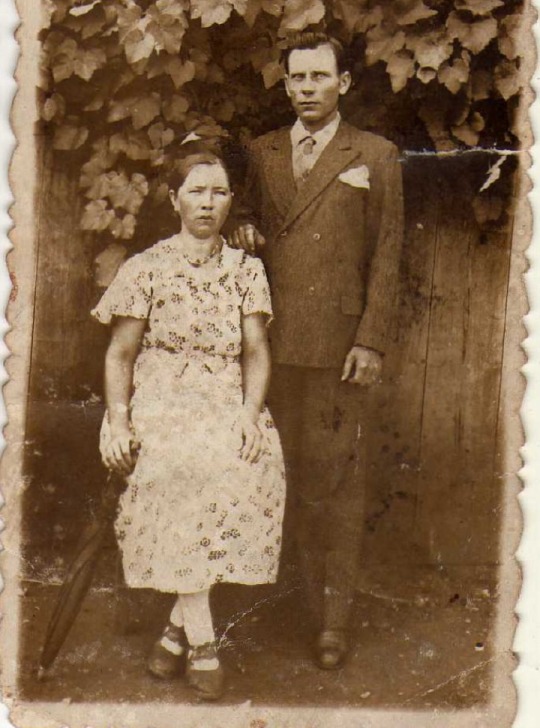
My great-grandparents, Anna y Alexei.
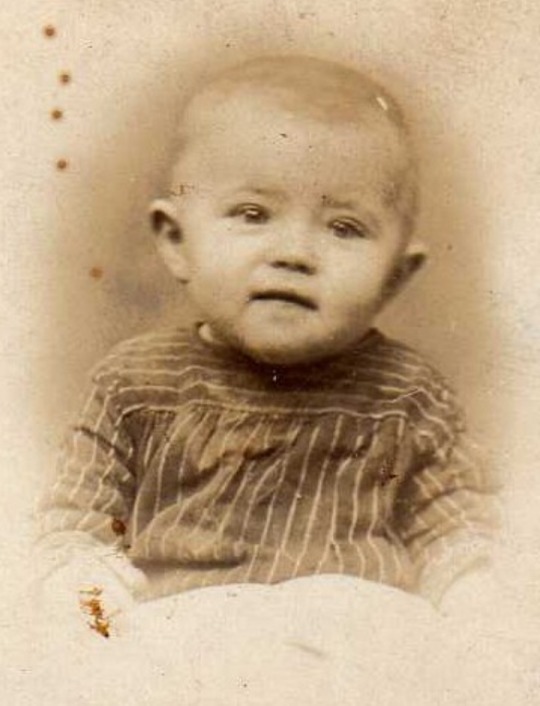
My grandmother, Tatiana, on her passport's photo at 1 year old.
I am learning Russian now (I was always interested but my grandma didn't wanted to teach me or her own daughters because after living in a slavic community in Paraguay, they all blended their languages -Polish, Ukranian, Russian, Georgian and others- to create their own... and when faced with people that spoke Actual Russian, they couldn't understand each other. So if any of us wanted to learn Russian we would have to do it with a popper teacher) and, as you've seen, I belong to a slavic social club (called Máximo Gorki, in Valentín Alsina, Buenos Aires) where we are trying for it to be back on its foot because otherwise will be gone for good. As a member of Máximo Gorki's Directive Board and as the only member under 40 years of age that has a grasp of the Russian Language I was asked to represent the club as a member of the Young Wing of the KSORS (Coordinative Counsel of Russian Compatriots -in Argentina-). And due to fate's sense of humour, I ended up in the Triunvirate that leads The Russian Youth. Of course by being associated with the Embassy... (almost) eeeeeevvvvvryyyyoooone is a huge Putin's fanboy/girl and they hold The Red Army high and with pride (which I understand, they were key to defeat Hitler during WW2... but everyone seem to forget that being and Ally was a rebound move after Hitler refused an association with Stalin, but well...).
Every year they make a huge deal of the Бессмертный Полк (the Inmortal Regiment, a celebration to honor the fallen during The Patriotic War -as they call them, instead of WW2-) and next year it'll be a celebration that will be all year long.
I try not to get related with such celebrations due to my family's history, so I'm torn between not knowing where to hide and expecting for someone to tell me anything about my (respectful) detachment of any event that they will plan. I'd like to one of them to try and tell me not to believe in propaganda when my own family back in the 1940s said that this is what happened. Had my grand-uncle not burn everything ever owned by my grandparents in a fit of rage, I would have receipts as well.
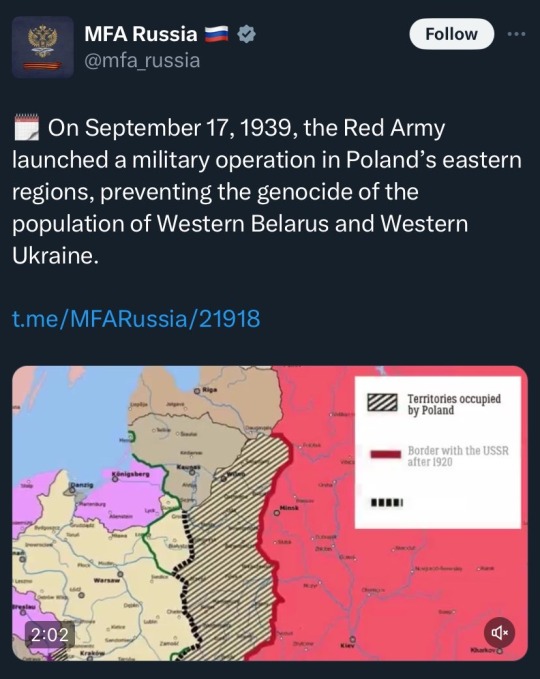
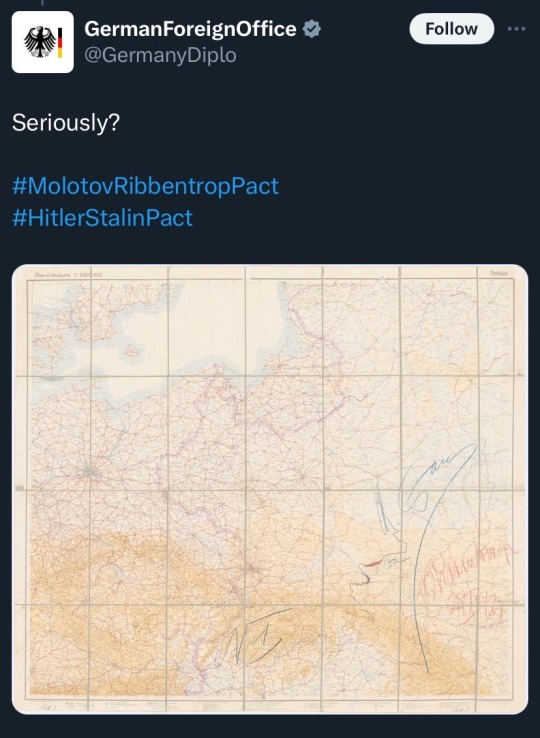
Russia trying to claim the 1939 Soviet invasion of Poland was actually a humanitarian operation meant to stop a made-up genocide, only for Germany to come out with a map presented to fucking Hitler of the Molotov–Ribbentrop Pact, which effectively set the stage for the combined invasion of the country and its partition between Nazi Germany and the Soviet Union, has to be the best destruction of modern state propaga I’ve ever seen!
847 notes
·
View notes
Text

There is a hidden track in my Unselected Poems in emulation of those unannounced pieces of music you - at least for the first time - did not expect to hear on an album, the first of which was (I think) ‘Her Majesty’ on The Beatles’ Abbey Road.
Of course my hidden track isn’t very hidden, because, thanks to a mix-up caused by me delivering everything as ever so very late, it’s listed in the contents. As ‘Little Red Robot (Hidden Track)’. Which means, if for no other reason, this edition must sell out, so that a reprint can correct my unfortunate error. You know what to do.
The poem is dedicated to the very talented Paul Summers, whose image of the Herd Groyne Light illumines my cover. (There’s also a grateful little nod to Smokestack Books via Howling Wolf, who recorded both ‘Smokestack Lightning’ and ‘Little Red Rooster’.) The Little Red Robot itself is the final alternative persona in the series which punctuates the various hitherto uncollected sequences which make up the collection.
*
Little Red Robot
The Herd Groyne Light at South Shields was, unbeknownst to strangers, a late Victorian robot made out of cast iron and corrugated steel that had, mid-bellow on its foghorn in the early 1960s, become self-aware.
The Little Red Robot had no arms, so, when it strutted round the docks and former shipyards on its three red legs it had to pretend it had its hands behind its back like a time and motion inspector.
Every now and then it would stride to the end of the pier and look out at the container ships crossing the bar. It supposed these contained spare parts for all the lighthouses of these islands - reflectors and bulbs and panes and frames and self-assembly kits, so that every route might be safely illumined.
It imagined that they contained all the sunken ships ever recovered or yet to be recovered, including those known only by sonar or submarine cameras as wielded by, it supposed, tiny submersible versions of itself, together with their drowned crews, properly readied for burial, and all their cargoes, whether tinned hams, stacked Willow Pattern porcelains, or ancient amphorae of, still, perfectly drinkable wine.
This made it so excited it could not contain itself, and it would squat and lay a red phone box or, sometimes, a scarlet pillar box.
As one of these was almost as outmoded as the other, police helicopters would come and chase it away, and council refuse trucks would set up a perimeter while they cleaned up the mess.
Occasionally, however, local people, who knew to look out for such incidents as their ancestors might have kept an eye out for wrecks, would post love letters, or attempt to make calls before the phone boxes could be shut down.
The authorities were legally obliged to honour these attempts at communication. But, to their bewilderment, they found they were mostly addressed to former regimes, fabulous entities, or, simply, the dead.
It wasn’t clear whether this was a marvellous coincidence, or something people felt compelled to enact - or if this was some metamorphosing power of the Little Red Robot itself.
Whichever, whether the letters were addressed to ordinary workers in the former Soviet Union, to Red Skelton or the Scarlet Woman of Revelations, or were recorded messages to dead aunts or ex-lovers, every effort was made to deliver such communications, even if this amounted to an official impersonating the intended addressee and forging their reply.
When this happened, the Little Red Robot felt like its imaginary arms had extended so far as to embrace the entire world!
#Unselected Poems#Smokestack Books#Paul Summers#The Beatles#Abbey Road#Little Red Rooster#Howling Wolf#Willow Pattern#Herd Groyne Light#South Shields#Red Skelton#The Scarlet Woman#Revelations#The Soviet Union
0 notes
Text



















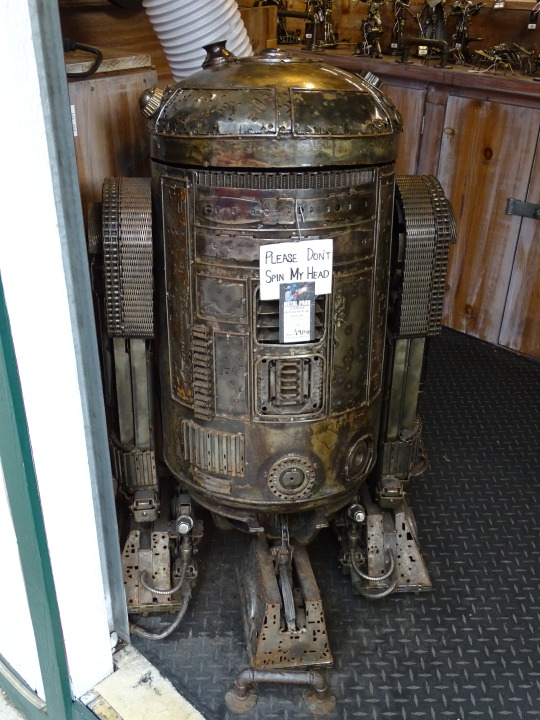
Extraterrestrial Culture Day
Extraterrestrial Culture Day exists "to celebrate and honor all past, present and future extraterrestrial visitors in ways to enhance relationships among all citizens of the cosmos, known and unknown." It was established with the passing of House Memorial 44 by New Mexico's legislature on March 21, 2003. (Memorials do not have the force of law, and do not need to be passed by both houses or be signed by the governor.) Although the day is specific to New Mexico, it has been celebrated by those beyond its borders.
State Representative Daniel Foley of Roswell introduced the day with House Bill 766. The bill designated the day to be celebrated on every second Thursday of February, but when the memorial was passed, the holiday was changed to every second Tuesday of the month instead. According to the memorial, the day was created because "extraterrestrials have contributed to the worldwide recognition of New Mexico through their many and ongoing visitations, sightings, unexplained mysteries, attributed technological advances, experimentations, expeditions, explorations, intrigues, provision of story lines for Hollywood epics and other accomplishments of alien beings throughout the universe."
How have extraterrestrials contributed to the worldwide recognition of New Mexico? It all goes back to 1947, to a spot about 75 miles from Roswell, where rancher Mac Brazel found debris in his sheep pasture. After finding metallic sticks held together with tape, a glossy and heavy paper-like material, and pieces of plastic and foil reflectors, he called the local sheriff. The sheriff called Roswell Army Air Force Base, and they came and took the debris away in armored trucks.
On July 8, 1947, the Roswell Daily Record ran a front-page story titled "RAAF Captures Flying Saucer On Ranch in Roswell Region." The following day, the Roswell Army Air Force put out a statement saying that it was not a flying saucer that had been found, but rather, it was remnants of a weather balloon. But by looking at the debris, it was pretty clear that it wasn't a weather balloon, and many people didn't buy the story, with some even believing that it indeed was a flying saucer.
In the decade that followed, many "dummy drops" to research ways people could survive high drops were done in New Mexico. Dummies with skin made of latex and bones of aluminum were dropped from the sky and military vehicles retrieved them. People found this quite odd, as it looked like aliens were falling from the sky, and some thought that was the case and that the vehicles that picked them up were taking them to get experimented on by the government. This did nothing but increase speculation that there had been a conspiracy and cover-up in Roswell in 1947.
In 1994, the Pentagon declassified most information about the dummy drops. They also declassified information about what they claimed had really been found in Roswell, which they said had to do with something called Project Mogul—a top-secret atomic espionage project. The General Accounting Office also released a report titled "Report of Air Force Research Regarding the 'Roswell Incident.'"
According to the government, Project Mogul was started during World War II and stationed at the Alamogordo Air Field, being made up of geophysicists and oceanographers from New York University, Columbia University, and Woods Hole Oceanographic Institution. The project placed balloons with low-frequency sound sensors in the tropopause, the area between the troposphere and stratosphere, where sound can travel thousands of miles. The hope was that they would be able to pick up information about nuclear tests taking place in the Soviet Union.
The report said that the debris was made up of 700 feet of neoprene balloons, radar reflectors, and sonic equipment. Some new materials were invented for use in Project Mogul, so it made sense that some of the materials weren't recognizable and looked otherworldly. According to the report, the Roswell Army Air Field didn't have any knowledge of the project. They weren't exactly sure what had been found, with some thinking the debris may have been from a Russian spy plane or satellite, but they just said it was a weather balloon because that made the most sense. Those at Project Mogul couldn't step up and say what it actually was, as that would compromise the project. In the present day, many don't believe the government's story, and some make trips to Roswell to be near the spot where they believe extraterrestrials crashed to earth. On Extraterrestrial Culture Day, we honor these and other extraterrestrial visitors.
How to Observe Extraterrestrial Culture Day
Perhaps the best way to celebrate the day is to go to New Mexico and attempt to find the Roswell crash site. Tours are sometimes also given. Official tours weren't given until 2018, and you could check if any will be held soon. There are also other tours you could take, which are given by local researchers that take people to various sites related to the incident. Roswell also has the International UFO Museum and Research Center and other attractions.
The day could be celebrated by reading a books about aliens or the Roswell incident. You could watch television shows such as Roswell or Roswell, New Mexico, or a documentary series like Ancient Aliens. There also is not a short supply of alien movies. Some classics include Alien, E.T. the Extra-Terrestrial, and Close Encounters of the Third Kind.
Source
#Mr. Spock#Star Trek#Verkehrshaus der Schweiz#Switzerland#Luzern#USA#Schweiz#Lucerne#Swiss Museum of Transport#replica#Mars-Rover#Ogallala#Nebraska#landscape#cityscape#woods#clouds#Extraterrestrial Culture Day#Star Wars#Stromtrooper#film#movie#second Tuesday in February#13 February 2024#original photography#travel#vacation#tv show#R2D2#tourist attraction
0 notes
Text
I was listening to alawyer describe 'Subjective versus Objective perspectives' and their usage in the courtroom, earlier today...
Subjective:
"What were the people involved thinking? What was their thought-process at the time of an incident?"
Objective:
"What kind of precedent do we want to set for society as a whole? What is our ideal? What is our goal in becoming a just society?"
I find this interesting because of my ruminating, obsessive mental argumentation which used 'social justice discourse' as its base and script.
The claim:
"Objectivity is racist, classist, sexist, ableist... (what other words can I think of... I haven't usually seen it described as homophobic.) There is not one, objective way of looking at the world. If you had endured as much suffering as my family has, for generations... perhaps you would understand. It has a background. The flower has roots in the earth.
I actually find myself understanding a similar feeling.
What is 'the right way' for a society to be?
Is it this way?
What's your idea?
How would it come to pass?
I find myself studying the societies of the Soviet union. They pretended to be objective, too... They thought they were right. They felt vindicated, even as they suffered. Perhaps the mockery of other people was an anesthetic to one's own condition of suffering.
Perhaps this suffering does not exist. I said it doesn't, so what? Will you pull it out of me? Will you vivisect me, just to prove I suffer?
Where on this anatomical chart is my suffering? Is it the spleen?
hmmm....hm-hm.
"Killing things is not so hard. It's hurting that's the hardest part, and when the Wizard gets to me... I'm asking for a smaller heart."
--- Amanda Palmer.
There isn't an end to a person. They aren't sentences.
...or even if one was imagined that way: I have sentences answer me back, in my thoughts. I have sentences that reprise themselves all the time, revealing new information in the sets of words that accompany them.
Mathematical...
I was suffering from a sort of subjective argumentation between two people in my head. I didn't really understand the arguments, but I pretended to take a side. This caused my suffering, because I was defending something I did not understand.
"I want to be a good person."
"Good can mean a lot of things. Can you do arithmetic?"
A line that people have either loved, or hated:
"I have no idea who I'm going to wake up as... Every day is brand new. The truth is alive, and it refreshes itself continually."
"Yes, but you're still you, right? How could you be someone else?"
A good question!
Actually... it depends on the definition of 'you'. I think I romanced with Egoic ideas too much. An Ego like dead skin...
Ah, something subjective... something not-literal.
Mathematics are much more clear. It either is or it isn't.
It isn't willy-nilly. There is a right answer and a wrong answer.
........*dipshit caricature of OCD*: "prioritizing math is racist and sexist".
Real argument I've heard.
sometimes I wonder, though... if some subjects of discourse are psy-optic. "Get them to tear eachother apart over the stupidest things. Imply that all of [demographic] are inherently unskilled in particular ways. Um... um... um..."
Yet, I also know that the human being can be insane enough to invent these sorts of distractions all on their own. Sometimes, there's just "luck" involved. "Things just work out a certain way." I've seen it happen enough to know it..... but there is always that possibility.
Even a 0.01% chance is still a positive possibility.
Maybe I just drove myself insane through boredom. Gotta find 'something to do'. That's the driving impulse, inside the vehicle...
Hey, I have a better car that you can drive, right here...
I found some really nice sketching pencils, with a gradient of softness/hardness... I started trying them out, and I feel so.... free!
Dude! I've wanted to delve deep into the detailing illustration for a looooong time, but I honestly hadn't thought to buy a set of sketching pencils. Some part of my psyche thought: "huff... Those are hoity-toity. I don't need other special pencils, when I have my trusty #2 ticonderoga!
I finally wanted to try them, because my mom had a set... I think that my parents might have bought a set for me when I was much younger, but I had no impulse to really use them, until they were "someone else's", first. Funny animal behaviour. Monkey see, monkey do...
I feel capable of life again, because my artistic sensibility is reactivated. I was in such a slog. My skill level was rapidly advancing, but my technology hadn't produced the results that I knew that I could... with a new tool!
:D
1 note
·
View note
Text
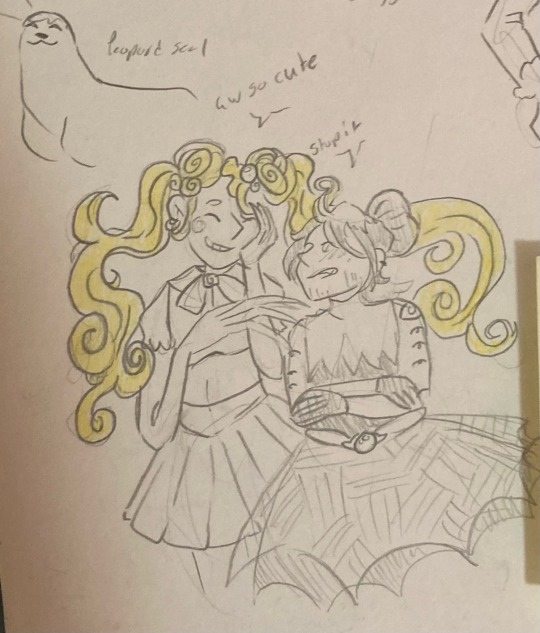
So… I did at one point draw these two in magical girl outfits.
Honestly I’m a sucker for magical girls (yet somehow I have never finished a single magical girl show??)
This drawing is actually one of the ones that inspired the current mundane horror au to also feature minor aspects of magical girls.
Note that this drawing is a joke, Michel and Gerry do not become magical girls in this au, though there is another character who is.
So another long post incoming, magical girls in that setting.
————whoo————
Magical girls as an institution was founded properly after ww2 but have their beginnings during the war. They started out as civilians with power contributing to the war effort, you know nationalism and all that, they did this informally and sometimes illegally as a lot of the powers ( including the spiral ( correction the majority of the dread pantheon and the “shunned” aspect of the admiration pantheon) where illegal or at least banned. These early magical girls (as a lot of them where women banned from joining the army or not able to help in other ways) became rather messed up as in trying to help out with their powers they would become stronger and risk being consumed by the powers. This was around the time that key charms came into existence. I haven’t decided who invited them or what country they originated from, they where rudemettary items in this case designed to sever off part of a person and a more specifically their power. It might have originated as an instrument to try to entirely remove powers from people. Though I don’t know yet.
Regardless it was only after World War Two that magical girls really became a thing. In part because the imperfect key charms of ww2 where redesigned and updated with research done in that era, including information that was learned from occult experiments conducted by the natzies.
(See this here is why I don’t like world building for urban fantasy, I’d rather not have to research natzi occultism but whatever, ww2 was when a lot of horrid experiments that happened all over and in a world where occult stuff is very real and well known about, I don’t see any reason why absolutely awful things where done with it. I’ll just leave those horror to imagination. Real world baggage in my fiction I loath you.)
Magical girls in their modern iteration where precent to small degrees and had the beginnings of thier larger organizations in the 1950s but took off in popularity in the 1960s seeing the first widespread use as an occupation in 1962. Then officially adopted as the main defense against monsters in 1966. The Cold War helping to propel the use and availability of key charms in both regions allied with the USA and Soviet union.
————occupation————-
Being a magical girl is seen as something like being in the scouts or an extracurricular mixed in with being a summer job. It’s a well paying job for young people still in school or just out of it.
Identities of magical girls are kept secret as a lot of them are minors when they start their careers (and usually end)
Some magical girls also have personas as idles and stuff; child stars, young athletes pushed to perfection, etc.
Most magical girls start their career around the age of 14-16 and most of them retire from magical girl work around the age of 25. Though there are people who began working with magical girl work as a teen and is still work with it in thier adult life. In some way or another, either as mentors or in the less glamorous but still important research, containment, disposal and legal departments.
It is notoriously rare for people under the age of 15 or so to have any sort of alignment if they where not born with it. But not unheard of.
The youngest anyone can be to apply for being a magical girl is 11-15 depending on the country though the average legal low bar is 13.
… let me look something up…
Ok according to the Geneva convention (article 4(3) (c)) says that anyone under the age of 15 can not be recruited to armed or groups allowed to partake in hostilities… good to keep in mind.
Noting that in this au their Geneva convention has some differences to our own as they do have people just walking around with powers. Some rules about how power can and cannot be used in warfare; like no zombies, what to do if a war zone becomes a domain, a lot of specifics that would require me reading the actual Geneva convention to list (mabey I should read that regardless), key charm users (aka magical girls) can not be used against humans.
Back to magical girls. most countries have their minimum age be whatever the minimum working age is or in the case of the USA where technically the minimum age is 16 for full time but where the minimum age is 14 for part time, there’s also exemptions to this when it comes to agriculture. So likely hood is that in this setting the minimum age is something around 14.
Though that being said becoming a magical girl requires a good deal of things, parents permission under the age of 18, at least two years of training. And that it doesn’t interfere with school for students under certain ages. Then of course a person has to have an alignment to a power, or in some cases at least a leaning to one power or another.
A lot of 15-16 year olds take the job because it pays really well even in the train period.
The reason for this ridiculously low age is for two reasons, a in-world reason and an out of world reason.
In world it is because key charms tend to bond easily with younger individuals. Having difficulty with making a permanent connection to anyone over the age of 27. As they operate in some ways simular to imaginary friends. So having teens make the connection is easier.
The irl reason is because a lot of magical girl media the characters are young to teen girls. Card captor Sakura is 10, sailor moon is 14, same for madoka magica, and the winx club member are between 16-18, Tokyo mew mew they are 13 to 16 years old, in magical girl do re me the characters are between 7-14. And even in miraculous lady bug The character of ladybug is 14. So I just kind of stuck with it.
Onto something else.
— — key charms-
Aka the means of transformation.
In order to be a magical girl instead of just a person with power.
Key charms; amplify existing power, prevent physical reformation, protect user from physical harm, heal injuries, strengthen physical abilities and sharpen a persons available senses.
Key charms are loosely explained at the end of these:
(In this one key charms are discussed under the category of artifacts)
So what are key charms and how do they work?
… good hypothetical question… unfortunately I don’t have a clue myself.
Ok that’s not entirely correct, I have ideas on how they work and function in practice, but not theoretically. Like what makes them tick, though I don’t think I will need to know that for this silly fic.
But here’s what I can explain.
A key charms is a small object, usually in the form of a pice of jewelry though not always. Each key charm is unique, and change when they are introduced to a power. Unable to bond with anyone that is not aligned with that power as that is what they have become.
Key charms are difficult to make whitch makes them rather rare. Then to add to the rarity of them is the fact that once a key-charm has bonded to a person it will remain bonded to that individual until the end of thier life unless something severs that connection. Though having a connection severed is usually a choice by both the key charm and weilder but it’s been reported that the power of the end and the desolation can sever that bond too.
Many key charm familiars and their magical girl will perform a passing on ceremony, with a ceremonial  “death” and a passing of the charm to its next wielder  .
So somewhat eluded too, key charms have thoughts and personality! Usually the personality that forms as a key charm becomes full fledged is one that mirrors its weilder. in the case for key charms that have had previous users the key charm will have the personality of the first user, though it may take up quirks of other users too.
Some key charms are able to sever their connections with ease so have had several users. Others are focused on the mission of defending humanity against monsters at all cost and will sever and take on new users as the need to fulfill that mission. This is the odd ones out when it comes to key charms as most form deep bonds to thier users.
Now outside of the need to form a bond a key charm dose a few other things.
A key charm forms “armor” around the user. This armor is what is visually seen as the magical girls outfits. The armor also obscures the identity of a magical girl. The same way someone with the power of the Stranger's face would.
This armor is made of exess power that the key charm has collected over the years with its user and others, this is inpart why the training period is two years, a magical girl can not go out on regular missions when they do not have armor. (It’s a safety risk!)
In part for identity protection but also for a meriad of legal reasons, like how with the armor the chance of injury is lowered. Not entirely remove but lowered. That and with a proper bond the injury can be healed by the key charms (a bit with how the power of flesh and strategy can heal).
The armor is not entirely real, made of light, (alchemy and crafting) some parts of the appearance are dictated by the key charm while other parts are influenced and dictated by the user.
When a key charm is not acting as armor it often takes on the form of a small creature, a familiar or a mascot if you will. This creature can be something like a little bird, a mouse, a cat, or frog. Other times it might be chimeric like a hedgehog with moth wings, or a griffon or a unicorn or a puppy dog with a lizard tail. Other times they take on the form of an amorphous thing, The creators of the key charms have no idea why these “mascots” became a thing but assumed it has something to do with the nature of powers as it’s still not well understood. (On my end it’s because, come on what’s a magical girl without some sort of mascot… still a magical girl, but missing out) (I have another post about what different creatures are capable of powers wise: xxx).
Now a key charm can only make the mascot and the armor, one thing they rarely can make is a magical girl’s weapon. Those are usually provided by a magical girls agency. Though once a key charm gets ahold of a weapon they can use the users natural power to do some interesting things with them. There’s a few reasons why a lot of a magical girls weapons are toy like. But sometimes an agency will just give a 16 year old a gun… I’m looking at you America.
Now a this whole ordeal about the armor and mascots and weapons is just extra to what key charms are mainly designed to do.
That is to allow someone with power to use and access that power without risking themselves or becoming consumed by that power. This key charms achieve quite well. As magical girls can become powerful but never suffer the body altering affects of powers.
————— magic, monsters and maintenance——
Magical girls hunt monsters, that’s what they do. But not everything with power is a threat so rules and procedures are set in place to work with this.
Magical girls generally rely on the numerical ranking system mentioned here:
To organize what kind of creature they are dealing with.
This is useful for a handful of reasons, such as determining how much of a threat a monster is and if it can be delt with by an individual or if a team is needed to contain it. If a monster is of too high of a threat the magical girls will either have another agency contain it or the seasoned older magical girls will be tasked with that creature’s removal.
Especially if they are dealing with anything that used to be human (or perhaps still is) as when dealing with those the rules are different from when a monster crawled out of the world of dreams. Or even former animals.
(Animal rights activism in this world is probably a right mess. Bigger of a mess than irl.)
Magical girls are not police. But often work with the police, governments and military. But only when it comes to monsters and research. Several magical girl institutions are multinational.
---- Police, Policy, Politics ----
Magical Girls are not Police Officers. they are not law enforcement.
they exist in a sort of limbo, meant to protect people from creatures of power, but hold no greater authority than pest control. Though sometimes that pest just happened to have been human…
the Magical Bureo of Investigation:
Or about five hundred other names that change depending on what country you are in.
when dealing with a monster that used to be human, even if slightly suspected of being human it is out of the magical girls jurisdiction. the most they can do is apprehend the creature and secure it until the Magical Bureo of investigation steps in.
these are the guys who are often derogatorily + commonly referred to as the Magical Police.
they are responsible for containment and care of people with power and their interaction with the public at large. They do a lot of messed up stuff that is relatively just swept under the rug. They also (try to) keep track of who has powers, how they are being used, and that they are interfering with normal life for normal people as little as possible.
For most people of power they play a very little part of their life.
They are also responsible for informing the public about paranormal phenomena, and keeping paranormal places (domains) from harming people. Also run prisons, and educational programs.
They don’t really do research, but they work with researchers, they don’t do public relations well.
A lot of magical girls continue onto careers in the burro or with associated agencies and companies.
The magic police are state run.
Hunters: the oldest of all these institutions, and mostly seen as an outdated practice, in cities that is. as magical girls have replaced hunters for the most part in cities, but hunting is still a common profession in rural areas or areas that simply can not afford to have other institutions in place. hunters usually work alone or in small groups. They work on commission. often having licenses to do thier work. allowing them some of the investigative powers like a private investigator.
Some hunters are organizing into loose guilds or unions.
All sorts of people can be hunters, and some hunters are not as picky about laws and such as the other institutions. There also exist rouge hunters. Two kinds, one is a hunter who continues to hunt even though they have lost their license or don’t have one in the first place, sometimes nicknamed the poachers. The other is hunters who believe that anything with any power is a monster and this needs to be exterminated. Not unusual for these types of hunters to overlap.
Some hunters specialize in hunting certain things, like vampire hunters.
Sectioned Officers: these are incidental. Popular and mainstream culture likes to keep themselves separated from the ongoings of power. But sometimes power comes nocking. Sectioned officers (and their equivalents in fire brigades and hospitals) are people either trained in dealing with crimes involving smaller degrees of power or more commonly they are officers who started out as normal officers and had one to many cases involving power and becalmed the designated go-to.
Magical girls are just as much a tool of propaganda as they are there to genuinely help people.
A lot of magical girls perform in charity events, do club like activities and often do this with these other organizations.
Magical girls as an institution have had a lot of controversies and internal issue, just like many IRL organizations. But is overall seen as a positive force on a young kids life, instead of being a “problem kid” or institutionalized. The world lives with the power, but dose not fully know what to do with them either.
————social————
So being a magical girl is a gender nuteral occupation. But because of it’s history it is more associated with girls. So when places are hiring for magical girls they usually advertise to girls.
But boys and Agendered and gender-fluid and so on so forth individuals can become magical girls. Key-charms don’t care what gender their user is or if it changes.
Another thing in regards to magical girls and why girls where originally targeted in recruitment was because of the false notion that girls are more likely to be aligned with the pantheon of admiration and boys the pantheon knowledge. (Magical girls sold themselves to the public as defenders of love, justice, and humanity against the treat of monsters.) beat the shit out of monsters with the power of friendship and love… and incredible violence. The last section is usually left out of PR stunts.
Because magical girls are generally associated with the pantheon of affection girls from other pantheons are encouraged to hide their actual alignment and simply claim that they defeat monsters with the power of love…. What kind of love? Uuugh, the love kind! Yea ignore the way I make shadows eat things, this is definitely the power of love. Stop asking silly questions…
Now another thing I have had to consider is the relationship between superheroes and magical girls.
See becoming a magical girl was not really pushed onto boys until the late 1950s during the silver age of comics. Where the notion of becoming a magical girl was rebranded a while as being a super hero. To some extent.
Supper hero comics where created during the Great Depression and ww2 for most of the same reasons they where in our world. As a way for a generation at was to learn how to cope with adversity and trauma… as well as instill a sense of patriotism and a tool for propaganda.
But superhero’s where generally marketed to boys.
With the idea that men where soldiers and girls where magical girls.
(Some superhero are relatively the same, but things like the X-men and such are very different than their irl counterparts, but Batman, wonder woman, and a lot of other superheroes are relatively the same )
One thing to note is that magical girls mainly operate in big cities. Rural areas and smaller towns are generally left to fend for themselves when it comes to monsters. Still using older methods of keeping monsters away, methods that are not always that affective in large cities.
Sometimes being a magical girl in your teen years is treated similarly to having been in Girl Scouts or something like that. It looks good on resumes as a lot of other skills are taught by the institutions.
It is also not unusual to find certain lower income families try to get their daughters to become magical girls. It pays well and offers a way up, in similar ways to how college in theory opens up more job opportunities and higher paying jobs. This is especially true for people who have power. Power can be a bit of an extra hurdle in getting jobs. Or keeping them. Especially depending what kind of power it is.
————conclusion——————
This whole magical girl aspect of this fic is actually sort of messed up and dystopian. Sort of the point.
I’d not want to live in their world.
I’m still considering naming them something other than magical girls with the name being so gendered, and sort of tied to anime. Even with the existence of non anime magical girls. Also what else could I call them?
All of this information is interesting and all, but relatively irrelevant to the fanfic proper. It’s just background information…
This is why I don’t normally write fanfics look at this mess.
#fanart#the magnus archives#tma micheal shelly#tma au#cw sexism#fictional ww2#brief mention of world war two#magical girl#cw natzi#worldbuilding#genuinely don’t know why i keep doing this#long post#lore#cw gun mention#I’m embarrassed so let me be#policing#tma gerard keay
1 note
·
View note